
‘...we are able to continue delivering high-quality care, meaningful innovation and enduring compassion – even as the healthcare landscape continues to change and evolve.’


‘...we are able to continue delivering high-quality care, meaningful innovation and enduring compassion – even as the healthcare landscape continues to change and evolve.’
Each year all providers of NHS services are required to publish a report on the quality of the services they deliver. This is called the Quality Account. This Quality Account aims to provide you with information about the quality of the NHS health services we deliver and our plans to improve further with the needs of service users and their families at the centre of all we do.
Our priority is to ensure that our services are safe, effective, responsive, caring and well-led. To measure our progress against this priority, we collect and review a range of information about our services throughout the year, which we report to our Board and our commissioners. We use this information to identify areas of good practice and to find areas for improvement, so that we can maintain and improve the quality of the services we deliver.
We hope you enjoy reading this Quality Account. If you would like to give us your view of our Quality Account, please contact us by email, post or telephone.
we are keen to hear
How to give your feedback on this Quality Account
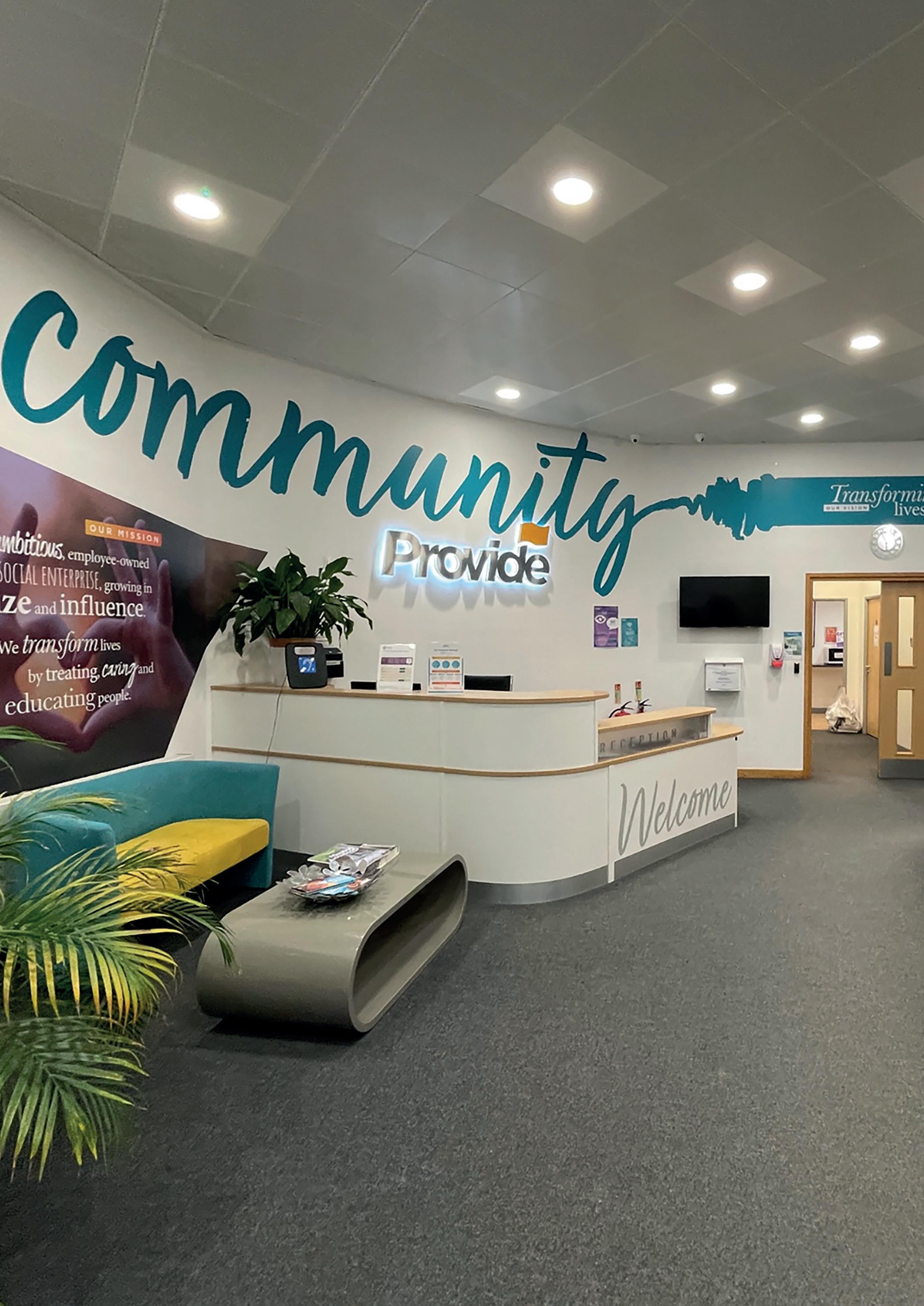
We are keen to hear from you if you have any views and suggestions on our quality priorities for the year ahead or feedback on any other aspect of the Quality Account presented here. You can contact us using the details below: BY EMAIL: provide.safetyandquality@nhs.net BY POST: Quality and Safety Team Provide Community, 900 The Crescent, Colchester Business Park, Colchester, Essex CO4 9YQ BY PHONE: 0300 303 9952
Once again it is my honour and pleasure to present our annual Quality Account to you. The Quality Account is important to us as it enables us to look back and really reflect on our services, how we keep them safe and the progress we have made with improving quality. This year’s Quality Account provides a clear demonstration of how dedicated and skilled our teams are at delivering safe and effective care, and their willingness to continuously innovate and work towards improving quality
Some of the highlights for me in this year’s report are the innovation projects that have come to life, using mobile delivery vans to reach people where they live and technology to provide instant access to expert advice so that prompt care can be provided. In my monthly Innovation and Ideas Surgery, which I launched in 2024, I have been impressed with the calibre of ideas and suggestions colleagues have come up with to improve the way we work or the services we deliver. Here at Provide Community it is really evident that our colleagues want to strive to develop and enhance their services and the organisation. I am committed to ensuring we encourage and support our colleagues to feel empowered to do this. Our colleague engagement survey demonstrates our staff do feel empowered and do go the extra mile. I would like to thank all our colleagues for their tireless work and for their compassionate approach to care that makes our services stand out.
In the year ahead we anticipate many changes as the NHS is reshaped by the Government. We will, as always, embrace any changes and ensure that we remain flexible but focused on quality and safety.
I hope you enjoy reading this Quality Account and if you would like to give us feedback about this Quality Account, we would be pleased to hear from you.
D Mark Heasman Group Chief Executive

Provide Community is a flourishing employee owned, community interest company (CIC). Care, innovation compassion are the pillars that fortify our foundation. We are committed to offering high-quality care and support Anglia, Dorset and Northern England.


Our commitment to delivering safe, responsive, and top-quality services sees us operating from a wide range of community settings such as community hospitals, clinics, nursing homes, primary care settings, and in people’s homes. We also extend our care through online services, making wellness accessible to all.
We take pride in being an employeeowned CIC, where every colleague is a key player in shaping decisions and sculpting models of working that reinforce our core values throughout the organisation. By placing employee engagement at the heart of our venture, we cultivate social value and foster a sense of shared responsibility and communal growth.
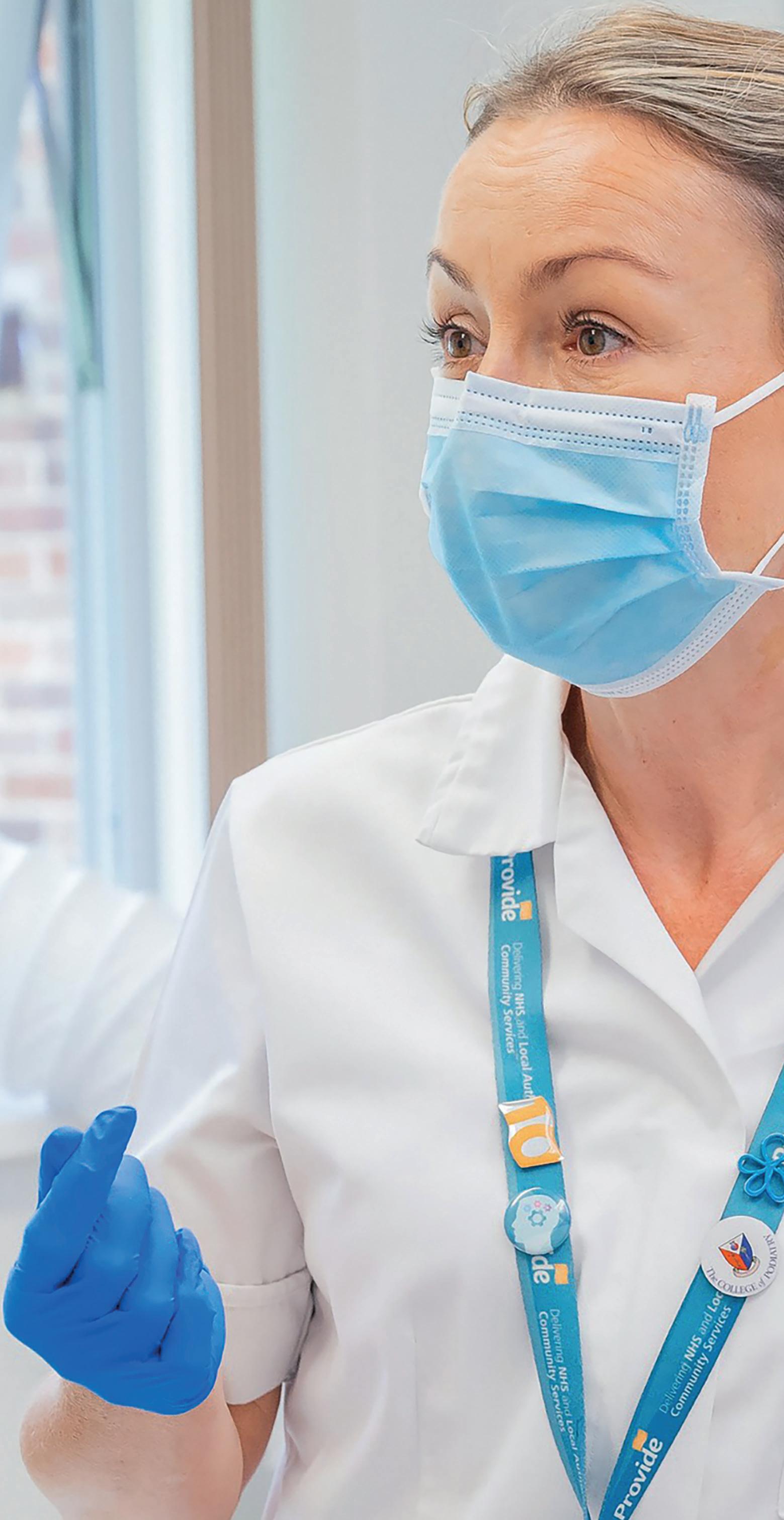


Our journey at Provide Community is deeply rooted in three fundamental values: Care, Innovation, and Compassion. These principles are not just a part of what we do; they are the essence of our identity. These values are the pillars that strengthen our resolve and guide our actions, ensuring we consistently make a meaningful impact in the communities we proudly serve.
‘At Provide Community, it is through the care we invest in our dedicated colleagues, our thoughtful practices, and our partnerships across the NHS and wider care sector, that we are able to continue delivering high-quality care, meaningful innovation and enduring compassion – even as the healthcare landscape continues to change and evolve.’
D Mark Heasman Group Chief Executive
An ambitious, employee-owned social enterprise, growing in size and influence.
We transform lives by treating, caring and educating people.

Care , innovation and compassion.
OUR VALUES
Our Board works in partnership with colleagues across the organisation to ensure the services we deliver achieve the standards of quality and safety required.
They have set in place systems and processes including safe premises, safe systems of work, guidance, training, equipment, and leadership to enable colleagues to work safely and effectively. The Board receives regular reports to inform them how the organisation is performing with regards to quality and safety. The Quality and Safety Committee is a subcommittee of the Board with responsibility for maintaining oversight of quality and safety. The committee takes action to address any issues affecting quality and safety and escalates any areas of concern to the Board for awareness and action. In 2024, the Quality and Safety Committee completed a full review of the committee’s schedule of business along with its subgroups to ensure the reports and escalations received remain relevant to the requirements for assurance.
At Provide Community we promote a ‘fair and just’ culture which supports a culture of fairness, openness and learning where colleagues can feel confident to speak up when things go wrong, rather than fearing blame. We also have systems in place that enable colleagues to speak up (whistle-blow) if they are concerned about quality or safety in the organisation. The Board ensures that we respond to incidents and complaints promptly, with openness and honesty, so that we can learn from them and ensure the people affected are supported and receive an apology and explanation when things go wrong. Our Board members are highly engaged, visible, approachable and enjoy meeting colleagues and service users first hand when they undertake their regular visits to service areas.

As an employee-owned organisation we have a strong Council of Governors made up of colleagues from across all areas of the Provide Community. The Chair of the Council of Governors sits on the Provide Community Board and represents the Governors and all colleague members ensuring that all voices are heard. Two guest Governors are also invited to observe the Board meeting each month to further their own development and support members.
Welcome to our Quality Account which I hope you will enjoy reading. Among all the reports the Board receives throughout the year, the annual Quality Account is always highly anticipated as it provides an essential summary of how we have assured quality throughout the year and sets out our ambitions for continuous improvement in the year ahead. As always it is wonderful to see so many improvements to quality being made by our colleagues who work across our services, delivering compassionate and innovative care that meets the needs of the people who use our services. We are an employee-owned organisation and our new employee strapline launched in 2024 is:
It’s not just my job, it’s my business!
This means everyone is really invested in what we do as a business and they contribute their expertise and ideas to ensure we flourish as an organisation, and that our vision, mission and values come to life. You can see this reflected in our Quality Account and, on behalf of the Board, I would like to thank all colleagues for their contributions and dedication. While we have much to celebrate, we continue to work on our ambition to reduce waiting times for our services. We are making progress in this area with a 50% increase in the number of our services working well within the national 18-week waiting time standard. The Board remains focused on this ambition and we will continue to work on this in the year ahead, in partnership with our commissioners and healthcare colleagues across the health care system. The year ahead will be busy as we adjust to changes being made to the NHS by the Government. The Board will work to ensure care delivery continues to be safe and effective during the transition and will ensure our colleagues are supported and continue to feel empowered to deliver great care.
Under the Health Act 2009 and the National Health Service (Quality Accounts) Regulations 2010, we are required to prepare a Quality Account for each financial year. Our Board is required to ensure that the content of our Quality Account is accurate and presents a balanced picture of the organisation’s performance over the period covered, and that the information reported is reliable and accurate and has been prepared in accordance with Department of Health Guidance. On behalf of the Board, I can confirm our Quality Account 2024-2025 meets the required standards.

Robert Parkinson Group Chair



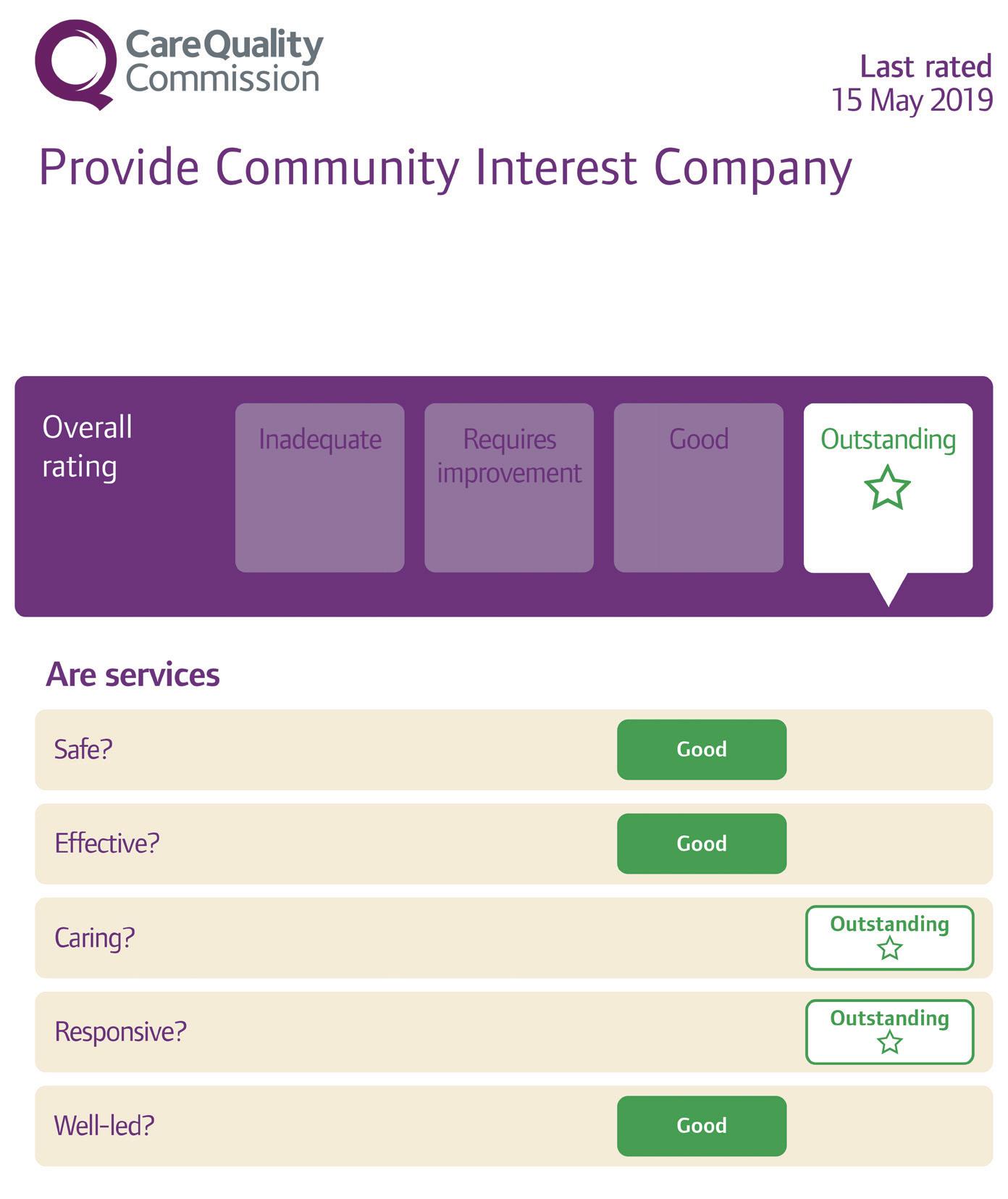
In this section we report on how we have performed against key measures organisations are mandated to report against in their Quality Account. As a community provider, most of the mandated indicators are not relevant but where we can report we have.

ACCURACY OF DATA CORE INDICATOR
Percentage of NHS patent records held which includes NHS number and General Medical Practice Code for a patient’s GP practice.
NHS Data Security and Protection Toolkit (DSPT)
PURPOSE

PROVIDE COMMUNITY
Recording the NHS number and GP details ensures patients can be identified correctly and receive appropriate treatment and information can be provided to their GP to support continuity of care.
Using this toolkit helps providers measure the quality of the IT data systems, standards and processes used to collect data.
Provide Community Rating ‘Standards Exceeded’
Participation in national audits enables us to measure the quality of the services we provide against other organisations delivering NHS care. This allows us to identify areas where we can improve our services.
Clinical research and evaluation of clinical care is a central part of the NHS, as it enables the NHS to identify and offer new treatments that improve people’s health. Provide Community promotes participation in research. In 2024-2025 we supported the following research projects:
RESEARCH AND EVALUATIONS IN 2024-2025
Postdoctoral Research Fellowship
Legacy Practitioners Evaluation
To modify and improve existing services providing recommendations for improving weight management in Essex to increase their effectiveness.
An evaluation of Legacy Practitioners looking at the optimisation of additional roles in Primary Care and the expansion of the Legacy Nurse programme to Social Care and Speech and Language Therapy.
University of Essex/Provide Community
NHSE funded research
Anglian Ruskin University
TELSTAR Study
Novel Motor Rehabilitation Interventions for Post-Stroke Patients
Musculoskeletal Physiotherapy
LoCUS
Technology Based Information sharing
A study to review telerehabilitation in stroke care; Understanding how it works and for whom to inform recommendations for practice.
Developing novel brain stimulation protocols to facilitate recovery of hand dexterity and upper limb function after stroke.
Stroke association / Nottingham University
University of Essex
National MSK Audit contributing data to a national database. Keele University
Multi-centre surveillance evaluation study on the use of ‘accelerate fan strapping’ to aid healing or retro-malleolus leg ulcers.
To enhance information sharing on patient discharge across the Mid and South Essex Integrated Care System through technologybased, co-designed approaches involving patients and colleagues across healthcare settings. Exploring factors affecting patients' and colleagues’ readiness and acceptability for technology-enhanced discharge in both acute and community healthcare settings.
Accelerate CIC
Anglia Ruskin University Cambridge / Mid and South Essex Integrated Care System

We published a regular research newsletter and shared it with all colleagues via Noticeboard, our internal newsletter. Noticeboard provides information about training opportunities, events and conferences as well as providing news about what is happening with research at Provide Community.
We refreshed our Research and Development Strategy which sets out our vision and approach to research.
We became members of the Mid and South Essex Integrated Care System Research and Innovation Programme Board
In our previous Quality Account, we set out our quality priorities for 2024-2025.
In this section we provide an update on what we did to achieve these priorities.
We will continue to develop our customer feedback processes.
We reviewed our Consent Policy to ensure we continue to share information appropriately with people.
We reviewed our Duty of Candour Policy and Incident Management Policy to include how we will engage with people when an incident happens to ensure they are kept informed and receive honest and timely feedback and support, including an explanation about what happened and an apology.
We recruited an experienced nurse to lead on engagement and involvement to help us build our systems and processes so we can improve on how we engage with people who use our services.
We have worked with North East London NHS Foundation Trust (NELFT) and Essex Partnership University NHS Foundation Trust (EPUT) who, together with Provide Community, make up Mid and South Essex Community Collaborative (MSECC), to refresh our Community Collaborative Engagement Strategy. We have partnered with MSECC colleagues to develop local engagement networks in our communities. Our agreed strategy principles are to:
• ensure that lived experience is at the heart of decision making
• utilise co-production when designing, redeveloping or delivering services
• understand and meet the communication needs of our service users
• work in collaboration to deliver the key principles

We will review our incident reporting and management processes.
In line with the requirement to ensure we report all patient safety incidents to the National NHS Learning from Patient Safety Events (LFPSE) Reporting System, we have aligned our incident reporting forms and database to the LFPSE system.
We have reviewed and updated our Incident Reporting and Management Policy to incorporate more information about how we will ensure those involved in incidents are informed and supported and how we will investigate proportionately to ensure we learn and improve the quality of services we deliver.
We introduced a weekly review of incident management including timeliness of handling and closure and a review of harm levels at our Health Senior Leadership Team meetings.
We embedded the national NHS Patient Safety Incident Response Framework (PSIRF) and undertook a one-year look back review of how we implemented PSIRF in our organisation. You can read more about this in the ‘Other ways we improved quality and safety in 2024-2025’ section below.
We will implement PURPOSE-T and the new National Pressure Ulcer Guidelines.
We have trained all clinical colleagues in the new Pressure Ulcer Risk Primary or Secondary Evaluation Tool (PURPOSE-T) and implemented these new risk assessments across our services. We have updated our Pressure Ulcer Guidelines to reflect the National Wound Care strategy guidelines. We are now supporting health partners in Mid and South Essex to roll out PURPOSE -T within their own organisation’s.
You can read more about this in the ‘Other ways we improved quality and safety in 2024-2025’ section below.
We will continue to build our safety culture on our community hospital wards.
We completed targeted quality improvement actions across our wards in 2024-2025.
We introduced a discharge survey which included the question ‘Did you feel safe?’ while on the ward and asked whether the care provided was different during the day or the night. In addition, we undertook telephone surveys to contact people who had been on the ward during 2024 and our Safeguarding Team visited the ward to speak to families and patients in person. We are pleased to report that people told us that they felt safe and that the care provided was of good quality, both day and night.
We have reviewed the ward welcome pack and introduced more information about how to ask for help and how to keep yourself safe while on the ward in a section called ‘Simple steps to keep you safe during your stay.’
We will embed the new Medical Examiner process and develop our Learning from Deaths processes.
We have now embedded the Medical Examiner reporting process in our organisation.
We have reviewed and updated our Learning from Deaths policy. We have refreshed our Mortality Review Group meetings to bring the right colleagues and data together to review mortality incidents and trends with the aim of learning from these types of incidents.
We have become members of the Mid and South Essex Learning from Deaths Forum to share learning and quality improvements with system colleagues.
In December 2024 we launched an Incident Review Panel Learning Bulletin which is circulated via our internal communications newsletter to provide a round-up of shared learning points from our Incident Review Panels. By sharing what we have learned more widely we can improve care quality and safety across the organisation.
Innovation is part of our core values at Provide Community and we take the time to promote and encourage it. In 2024 our Chief Executive Mark Heasman, launched his monthly Idea and Innovation Surgery to engage with colleagues about their ideas. This has been well received and lots of ideas have been shared with Mark, some of which have already come to life.



We also have a proactive Innovation Team that gathers in suggestions and ideas, from individuals and services across the organisation, and facilitates the growth of these ideas into projects. They do this by evaluating the ideas, considering their likely impact and the likely return on investment so that the best ideas are prioritised and worked up. This process has enabled a total of 29 unique ideas to be explored. The Innovation Team also encourages colleagues to share problems and tricky issues they face on a day-to-day basis. The team then creatively explores whether there is an innovative solution that can be achieved to solve some of these issues. Colleagues who put forward ideas or problems to solve, are involved and fully credited as part of the process and updated on progress. The following pages showcase a selection of some on the innovations delivered in 2024-2025.

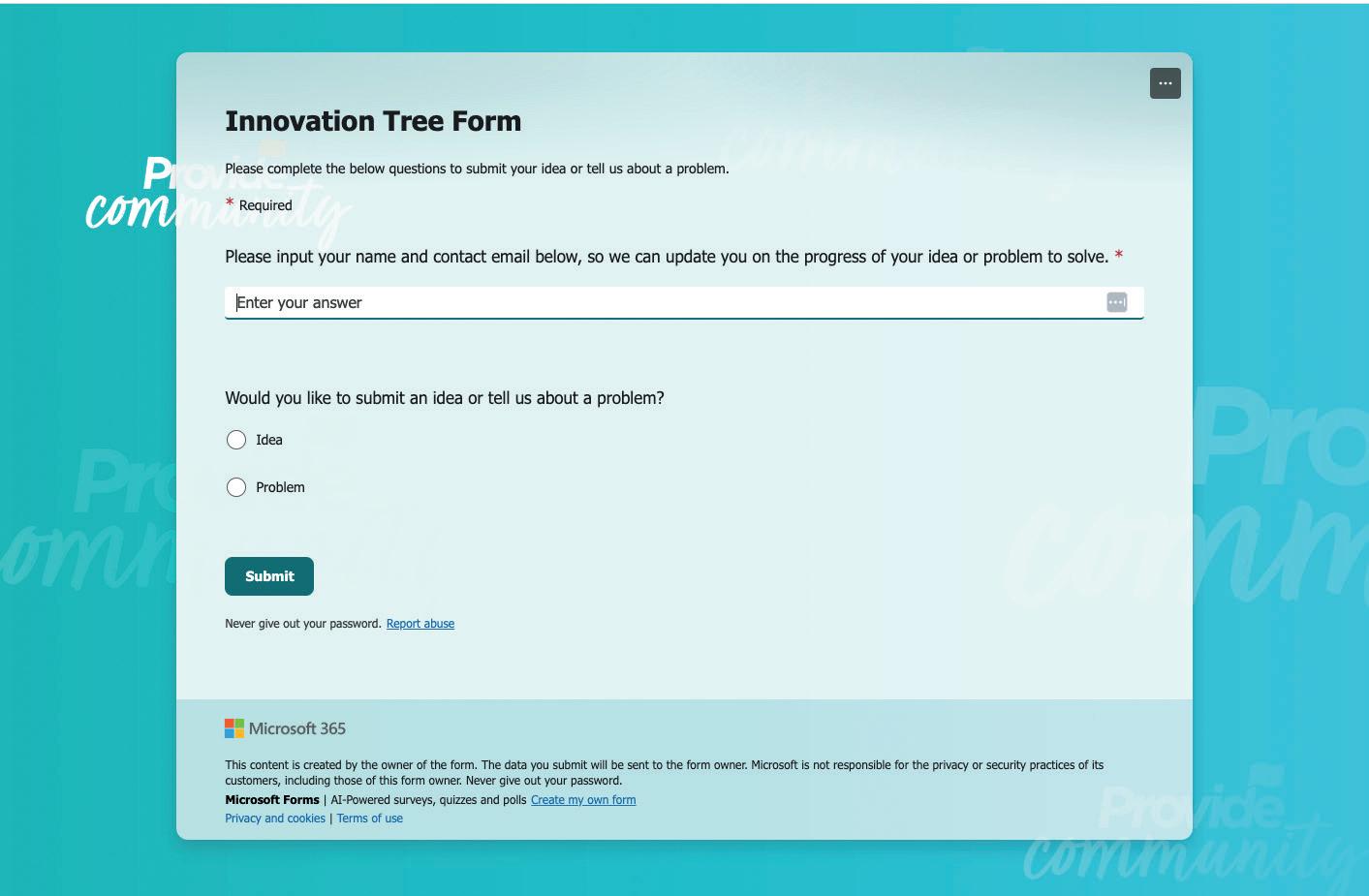


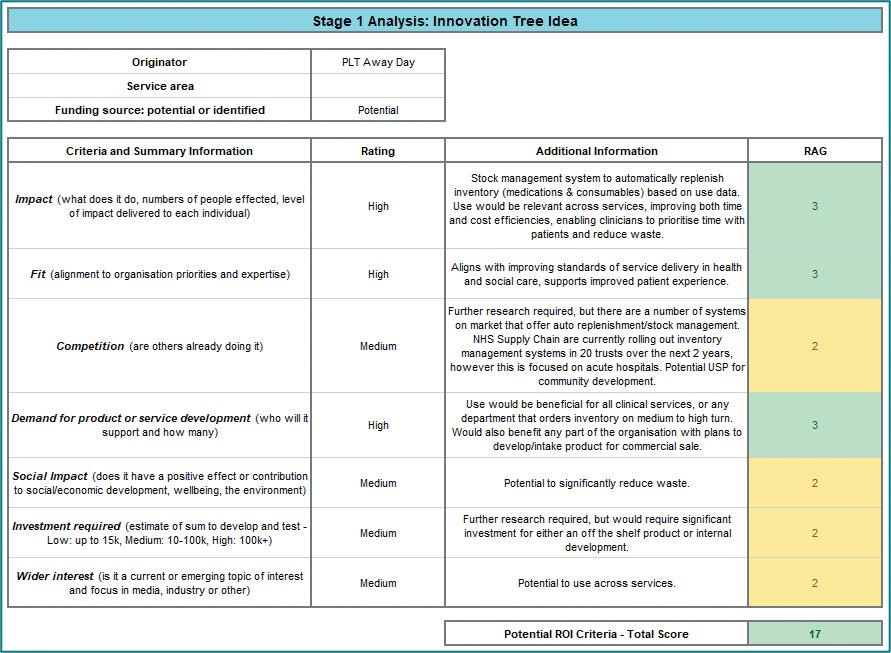
AssetVoice is an equipment management system in use within Integrated Care Teams to monitor the allocation and movement of syringe drivers. Its application is a mobile app to scan QR codes and a back-end data system. It takes approx. 20 seconds to scan an asset and make an action within the app, vs the previous manual sign out process which was time consuming and open to human error. Since the start of the pilot in August 2024, 100% of syringe drivers have been accounted for 100% of the time, enabling responsive and efficient planning and in the end-of-life pathway. The pilot will continue into 2025-2026, incorporating additional high value medical equipment including VAC pumps and dopplers.
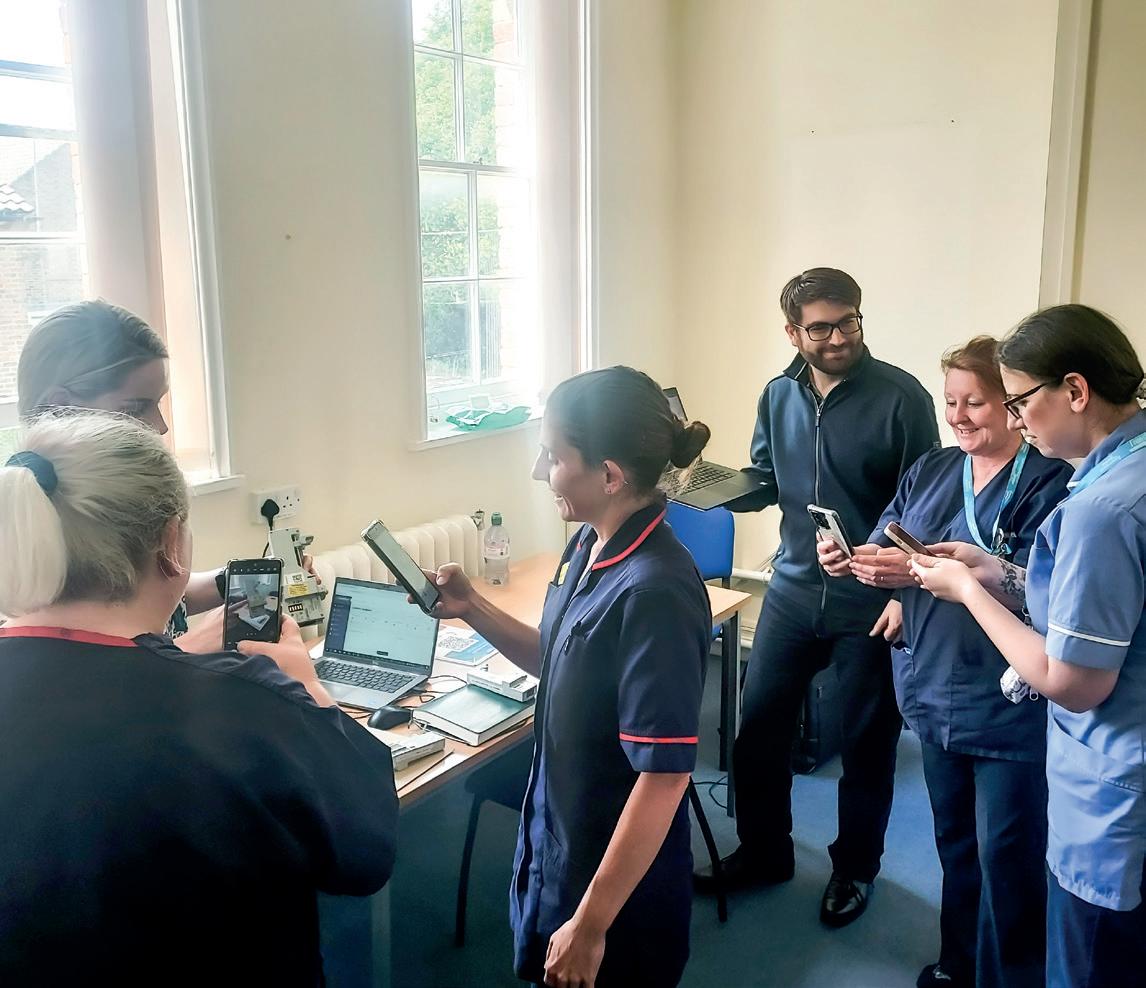

The Six Item Condition and Injury Questionnaire, a peer reviewed self efficacy measure, is currently being implemented into MSK services to assess patient activation. Following a successful small-scale pilot validating the measure against clinician opinion, the questionnaire has now been embedded into the updated Self Referral System. Launched in February, data is being collated to validate on a larger scale and measure against discharge outcomes. The project aims to enhance efficiency by reducing clinician workload assessing patient activation, enabling more tailored care and improving patient self management within our patient population.
This is an ongoing trial assessing the impact of bone conduction headsets on children diagnosed with glue ear. The project aims to explore the impact of these devices in supporting hearing, speech, and communication for children with glue ear and consider changes in the associated conversion to grommet surgery. Findings are largely positive, with parents reporting improvements with their child’s hearing, speech and communication at home and at school. All participants so far have indicated that they would like to continue using the headset.

Charging port
Increase volume
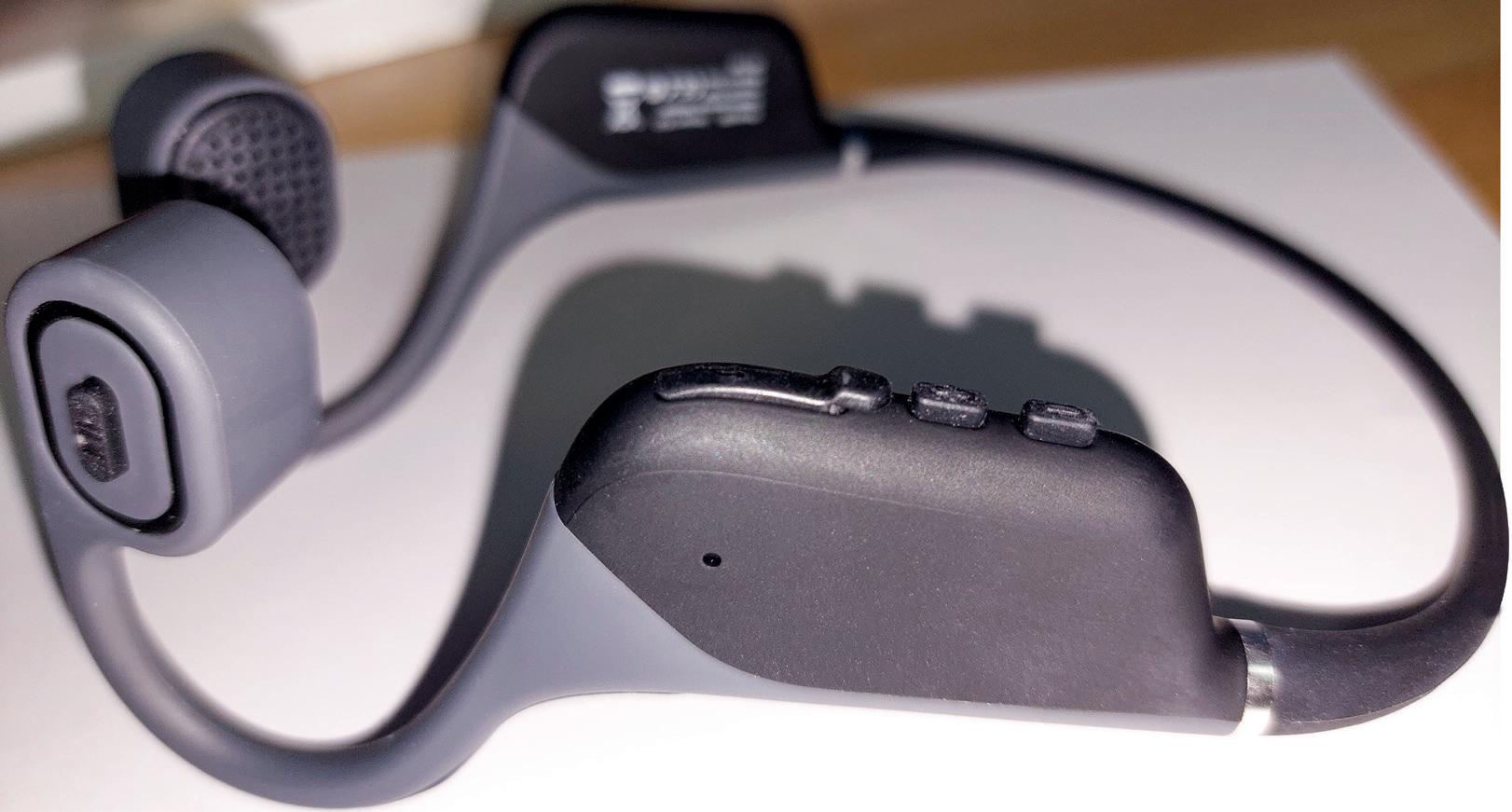
Decrease volume
On/off and Pairing button
We are very focused on infection prevention and control at Provide Community, as well as on environmental sustainability. We have strict processes in place to ensure that supplies and equipment used to deliver care are kept clean and free from contamination, but this can be at a cost to the environment when single use plastics are used.
When working in the community our colleagues need to transport equipment and supplies in their cars and then carry them into and out of people’s homes to deliver care. To make this process easier for our community nurses and to minimise the use of single use bags we have invested in some new nurse’s bags for the team. The new bags have been developed with community nurses in mind, so they have the right space and compartments for the clean storage of supplies and are easy to clean and decontaminate.
To ensure the bags do not become overfilled with supplies, which risks them going out of date, and that the bags do not become dirty which would pose an infection prevention risk, we have established a process whereby bags are emptied, cleaned and decontaminated daily at each base and restocked in line with a standardised list of supplies and equipment.
This means no nurse owns a particular bag, they are allocated a bag for use and return on their shift. This system ensures agency and bank nurses also get a bag for their shifts with all the right equipment and supplies they need. The bags are proving popular with colleagues and patients have commented on how professional they look. The introduction of the bags has enabled us to reduce the amount of equipment and stock nurses carry in their cars, which has, in turn, decreased the expenditure on excess stock, reduced waste from out-of-date stock and minimised the number of single-use plastic bags we use.
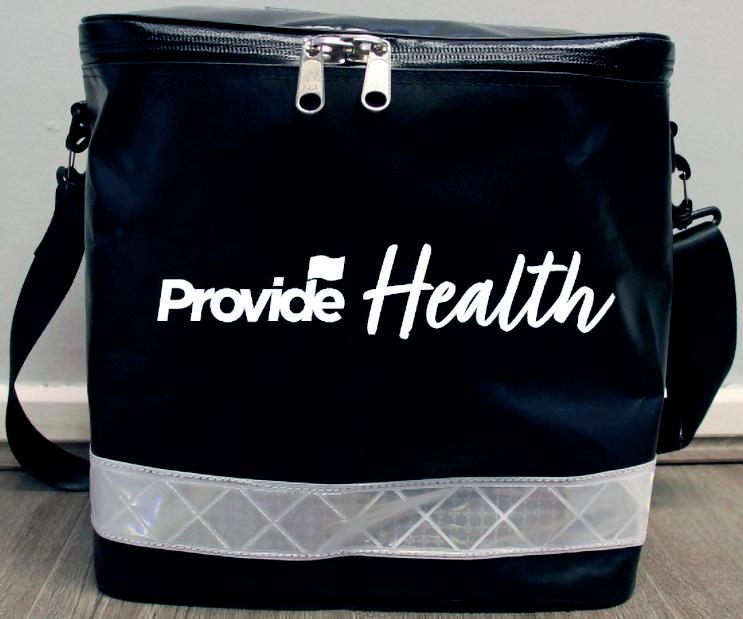
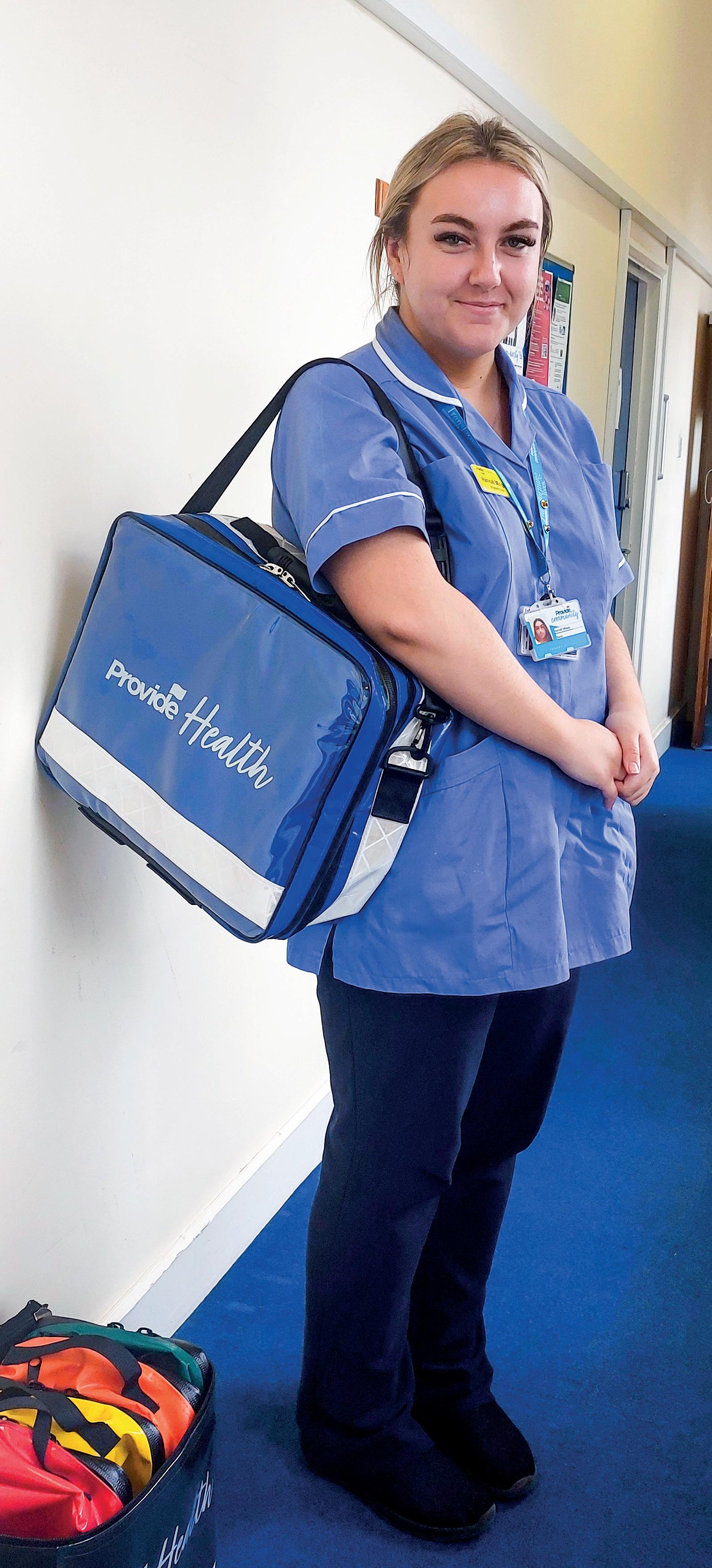
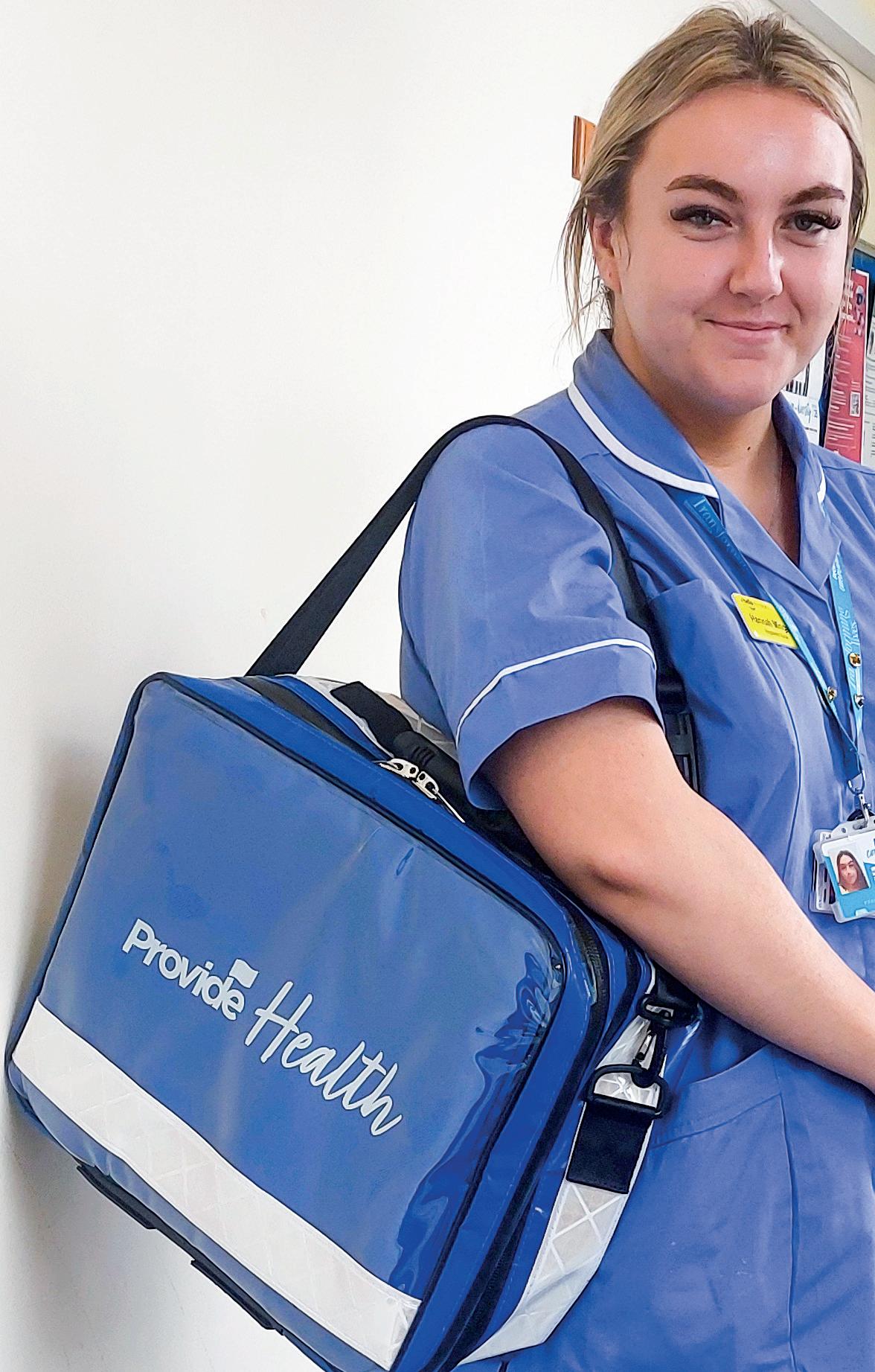
In 2024 we completed a review of pressure ulcer themes and trends to consider areas for quality improvement. Feedback we have received from families involved in pressure ulcer incidents helped us understand the impact pressure ulcers have on people and we are committed to learning from their feedback and using it to improve quality. One of the areas we identified for improvement was how we communicate with carers and family members and other care providers when we are supporting someone with a pressure ulcer. In response, we developed Pressure Ulcer Prevention packs (we call these PUP packs.)
PUP packs provide information for the service user, their family and other care providers about any pressure ulcers present and the plan for how they should be managed, so everyone is supporting the service user the same way. This helps to ensure consistency and clarity of approach. It also contains advice on how to prevent pressure ulcers developing or getting worse as well as advice on how to promote healing. The pack also provides information about equipment that is in use and how to escalate any concerns or ask questions about the care plan.
In addition, we implemented a new pressure ulcer risk assessment tool to enable us to improve how we identify if someone is at risk of developing a pressure ulcer. This new tool is called PURPOSE-T (Pressure Ulcer Risk Primary or Secondary Evaluation Tool) which is designed to identify adults at risk of pressure ulcer development in hospital and community settings.
To share our learning from incidents and to support the implementation of the new PUP packs and PURPOSE-T, we provided an information packed conference to clinicians of all grades. The conference was very well attended and our clinicians were very engaged in the process which has resulted in the successful roll out of PURPOSE-T and the PUP packs. Due to the success of this in Provide Community, we have been asked by the Mid and South Essex Integrated Care Board to help with the roll-out of PURPOSE-T across the health care system in Mid and South East Essex.
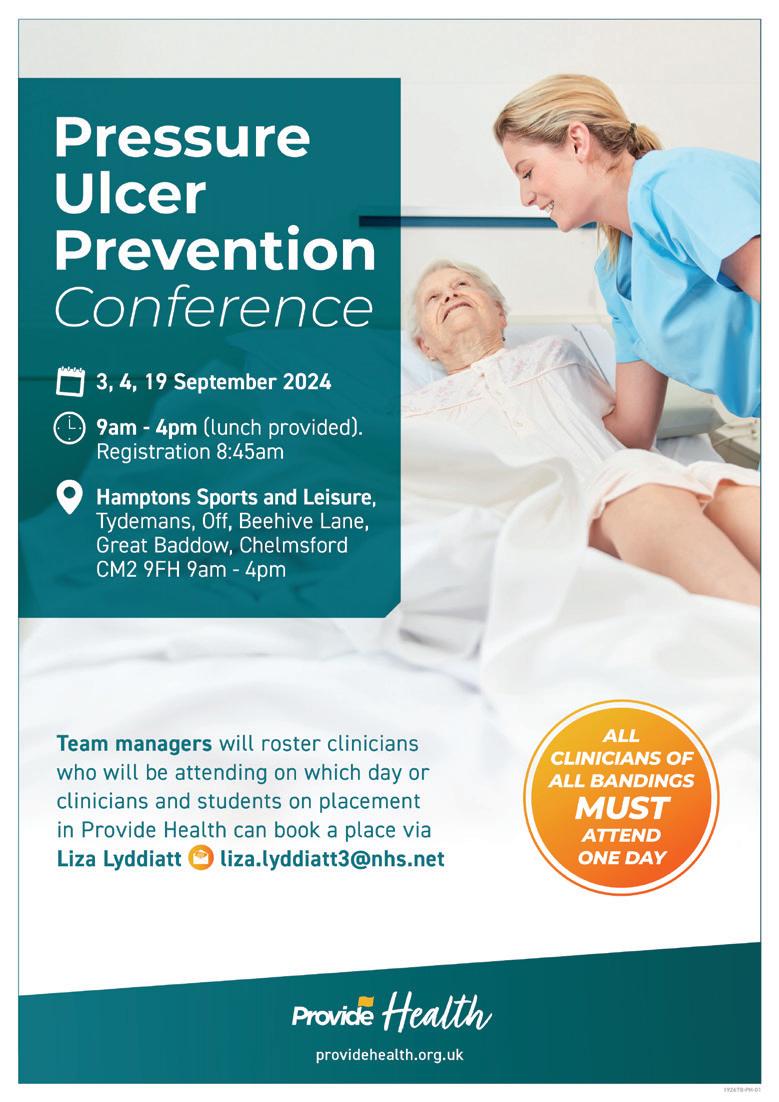
Provide Community has been collaborating with Essex Partnership University NHS Foundation Trust and North East London NHS Foundation Trust, who are our partner community health providers in Mid and South Essex Community Collaborative, to review how we deliver bladder and bowel services across our system. Provide Community has been leading the programme to align service delivery across the three providers so that there is more equity of care across our services. We have enjoyed working as a Collaborative with our colleagues coming together to share ideas and network. By working together, we have shared expertise and knowledge and we have seen real benefits for people who use our bladder and bowel care services. One of the ways we have done this is with the introduction of washable containment products, enabling people who need these products to have more control and independence as they do not need to rely on our services to order repeat prescriptions. The products are also comfortable, discreet and more environmentally friendly so they have been well received by the people who use them.
As a community healthcare provider we play an important part in helping people to get home safely from hospital after an episode of care. After discharge we provide expert care to people who need it to help them while they recover at home. Getting people home with the right care in place is important, and sometimes people stay in hospital longer than they need to while hospital colleagues work to arrange support for them when they get home. To help hospital colleagues to identify what medication people normally take at home and what care support they already have in place at home, we have given them access to our electronic system to share this essential information. We have also allocated a community Matron to work in the hospital to show colleagues how to find the information they need in the electronic system and they have helped the hospital teams to gain more awareness of what other care and support is available in the community that could support people at home after discharge. This initiative ensures people get the help and support they need when they get home from the right agencies. The Matron can also teach people how to manage their care themselves so they can be more independent and less reliant on outside help. The impact of this initiative is:
a reduction in unnecessary assessments and waits for community care people get home from hospital sooner and they are kept safe with the right support in place
self-care enables people to be more independent and less reliant on community services, freeing up community capacity to support those that need it
hospital beds are freed up so they are available for the next emergency admission
Nationally the NHS is experiencing huge demand for care that can lead to pressure for beds in acute hospitals. In the community we support acute hospitals to free up beds by facilitating transfers to our community hospital inpatient wards. Our community wards provide on-going care and rehabilitation to people before they are discharged home. We need to manage our beds effectively to maximise the number of people we can transfer out of the acute hospital.
In 2024-2025 Provide Community worked with Essex Partnership University NHS Foundation Trust and North East London NHS Foundation Trust who also manage community hospital inpatient wards, to standardise the admission criteria for our wards. By working collectively to a standard criteria we ensured that we optimised bed capacity. This is because we were able to offer a wider number of beds to more people as we had less limitations on how the beds could be utilised. To improve oversight and efficiency we also set up daily ‘flow huddles’ to review bed capacity and agree transfers. The flow huddles also serve to identify and rapidly resolve any issues contributing to delays with transfers or discharges which improves quality and speeds up the turnaround of unoccupied beds in community wards. The result is more beds are available to support new admissions in the acute hospitals.

In October 2023 we transitioned from the NHS England National Serious Incident Framework to the NHS Patient Safety Incident Reporting Framework (PSIRF). PSIRF sets out the NHS’s approach to developing and maintaining effective systems and processes for responding to patient safety incidents for the purpose of learning from incidents and improving patient safety. During 2024-2025 we embedded PSIRF within our systems and processes. The four key aims of PSIRF are:
compassionate engagement and involvement of those affected by patient safety incidents
application of a range of system-based approaches to learning from patient safety incidents
considered and proportionate responses to patient safety incidents
supportive oversight focused on strengthening response system functioning and improvement
Within Provide Community we ensure safety is everyone’s business. When an incident is identified, we ensure the people involved receive appropriate care and support, the incident is reported and action is taken to minimise the likelihood of it recurring. The new PSIRF framework has strengthened our approach to managing incidents including how we use themes and trends from reporting to proactively improve the quality of our services. In March 2025, Mid and South Essex Integrated Care Board undertook a review of how Provide Community has embedded the PSIRF principles and commended us for the progress we have made. The ICB said:
‘Provide Community has established a culture of learning, transparency, and patient safety. Provide Community’s proactive approach in refining policies, enhancing engagement, and ensuring effective governance has set a strong foundation for future improvements. The organisation’s dedication to continuous improvement, patient safety, and organisational learning has been clearly demonstrated, and the strides made over the past year are a testament to Provide Community’s commitment to high-quality care.’
We delivered the NHS England Patient Safety training curriculum for patient safety training and PSIRF training to the Board and colleagues across the Organisation including at our induction for new starters. The Quality and Safety Team also run bi-weekly incident management drop-in sessions in addition to scheduled training for teams or individuals as requested.
The Quality and Safety team share learning from incidents in our colleague newsletter and they have also launched quarterly ‘Afternoons with the Quality and Safety Team’ sessions, where they share learning and innovations. The team includes patient safety specialists, safeguarding specialists, infection prevention specialists, pharmacists and senior service managers.
What our colleagues said about PSIRF:
‘I feel a valued member of the investigation process and feel listened to for my expertise.’
‘Plenty of lessons are learnt, the new bulletin for learning after Incident Review Panel is a great way to disseminate learning.’
We have updated our Incident Reporting and Management Policy and processes and our Duty of Candour Policy to ensure patients and family involvement is central to our incident responses and to ensure there is clear guidance on our approach to reporting and managing incidents in line with PSIRF best practice principles. We have also refreshed our PSIRF plan, outlining our priorities for 2025-2026.
The Quality and Safety Team has been restructured, ensuring sufficient capacity for oversight and quality assurance and a new Quality and Engagement Manager and new Patient Safety roles have been added to the Quality and Safety Team.
In line with PSIRF guidance we have introduced a range of incident review tools and processes to enable a proportionate and responsive review of incidents. Colleagues have been trained on the use of the tools and are supported by the Quality and Safety Team to select the most appropriate approach to maximise learning from incidents to improve quality and safety.
The Board’s commitment to fostering a culture of safety has been reinforced through enhanced training on Speaking Up for Safety which was introduced in 2024-2025. Through learning from pressure ulcer incidents, we have implemented a new pressure ulcer risk assessment tool and are leading the health system in Mid and South Essex to adopt the new risk assessment process. We have presented learning from PSIRF at the Mid and South Essex


Learning from the deaths of people in their care can help providers improve service quality and safety.
We have taken the time during 2024-2025 to ensure our internal Mortality Review Group aligns with the NHSE published mortality reporting best practice guide. To facilitate the change, we adopted a three pillars approach to monitoring and learning from deaths: mortality metrics, reviews of deaths encompassing patient stories and service improvement.
The Learning from Deaths programme delivers a structured way of reviewing deaths and identifying learning, to ensure we are not working in silo. As a provider, we have joined the Learning from Deaths forum led by Mid and South Essex Integrated Care System, where collectively we prioritise learning from deaths of people across the system. It is anticipated that the quality of the care we all provide to patients and their families will be improved from this collaboration.
In April 2024, the statutory medical examiner system, involving all providers, was launched and embedded in practice, we welcomed the external scrutiny and have a process for reporting deaths that occur in our community hospital inpatient wards to the Medical Examiner and created a two-way channel for communication.


Our priorities for the year ahead are designed to ensure continued delivery of high-quality care across Provide Community and to contribute to improvement of health and social care services within the health and care systems where we work.
Our priorities focus on maintaining and improving:
Patient safety
Patient experience and customer engagement
Clinical effectiveness OUR PRIORITIES FOR 2025-2026:
1 Customer Engagement and Involvement
We will continue to develop our customer feedback processes to enable more people to give us feedback and to help us understand the lived experience of all people who use our services, including people from hard-to-reach populations, or who experience health inequalities.
2 Deteriorating Patients – Community Inpatient and Virtual Frailty Wards
We will review our systems and processes to build our approaches to supporting people experiencing a deterioration in their condition to enhance safety.
3 Category 4 Pressure Ulcers
(Inpatient and Community)
We will continue to embed the PURPOSE-T risk assessment process across the organisation and evaluate the impact.
4 Medication - Insulin Safety
We will review insulin incident themes and trends to identify opportunities to improve safety and quality.


This section provides a review of our quality performance in 2024-2025 set against the quality standards of being safe, effective, caring, responsive and well-led. The information included demonstrates some of the ways we measure how well we are doing and enables us to explain where relevant, the action we are taking to improve our performance.
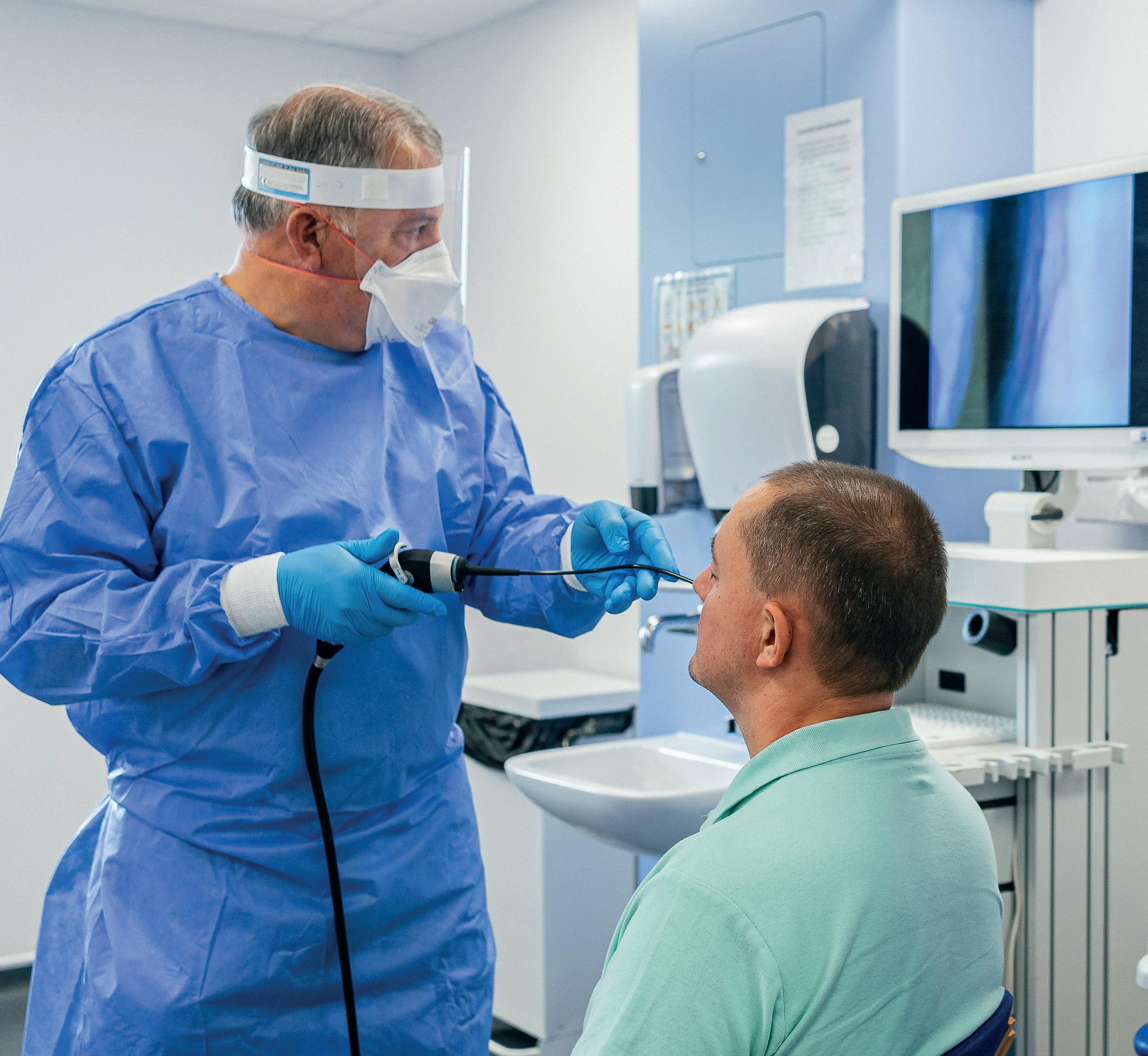
After another busy year at Provide Community, I am delighted to once again present our Quality Account which sets out how we have approached and achieved safe, effective care and worked to improve quality in the last year.
From a quality and safety perspective it is has been a year of focus for us on embedding the NHS Patient Incident Response Framework (PSIRF) which guides how we report and respond to incidents. In March 2025 our commissioners undertook a review of how we have implemented the PSIRF principles into our daily practice and they commended us for our progress. PSIRF has enabled us to review incidents in a robust manner and has set in place a more collaborative, proportionate and proactive approach to reviewing incidents so that we can focus on improvements.
We have really started to see the impact of PSIRF on how we learn and ultimately improve the care we deliver. PSIRF has provided more focus for us on how we engage with colleagues and service users and their families and this has enabled us to use their lived experience to make some real changes in the way we deliver services following incidents. For example, a PSIRF spotlight was shone on pressure ulcer incident themes and trends which enabled us to see where we could make a difference. This resulted in the development of new pressure ulcer training and resources to improve pressure ulcer care and the way we communicate with families and carers. Our colleagues really embraced our pressure ulcer improvement initiatives and we were pleased to be asked by our commissioners to support other organisations to implement some of the changes we made.
In the last year we have also made steady progress on reducing waiting times in some of our services so we now have more of our
services operating within the NHS 18 week waiting time standard. This is good to see particularly as we have seen demand for our services continue to grow each year. We are also pleased to report that in the last year, we have received a lot of compliments from people who have experienced great care from our colleagues.
The feedback we get from people who use our services is really valuable and I would like to thank everybody who has taken the time to send us feedback. Overall, we get very positive feedback about our colleagues and our services and I would like to recognise our colleagues who make this happen and say thank you to them for their professionalism and care.
I think it is fair to say the last year has been hard work but rewarding. I am confident the year ahead will be busy but successful. However, if you think we have not addressed an area of quality that you feel we should focus on, please do get in contact as we are always ready to listen and act on feedback. Our contact details are at the front of this document.

Lucy Wightman Chief Executive Officer Provide Health and Group Chief Nurse
You are protected from abuse and avoidable harm
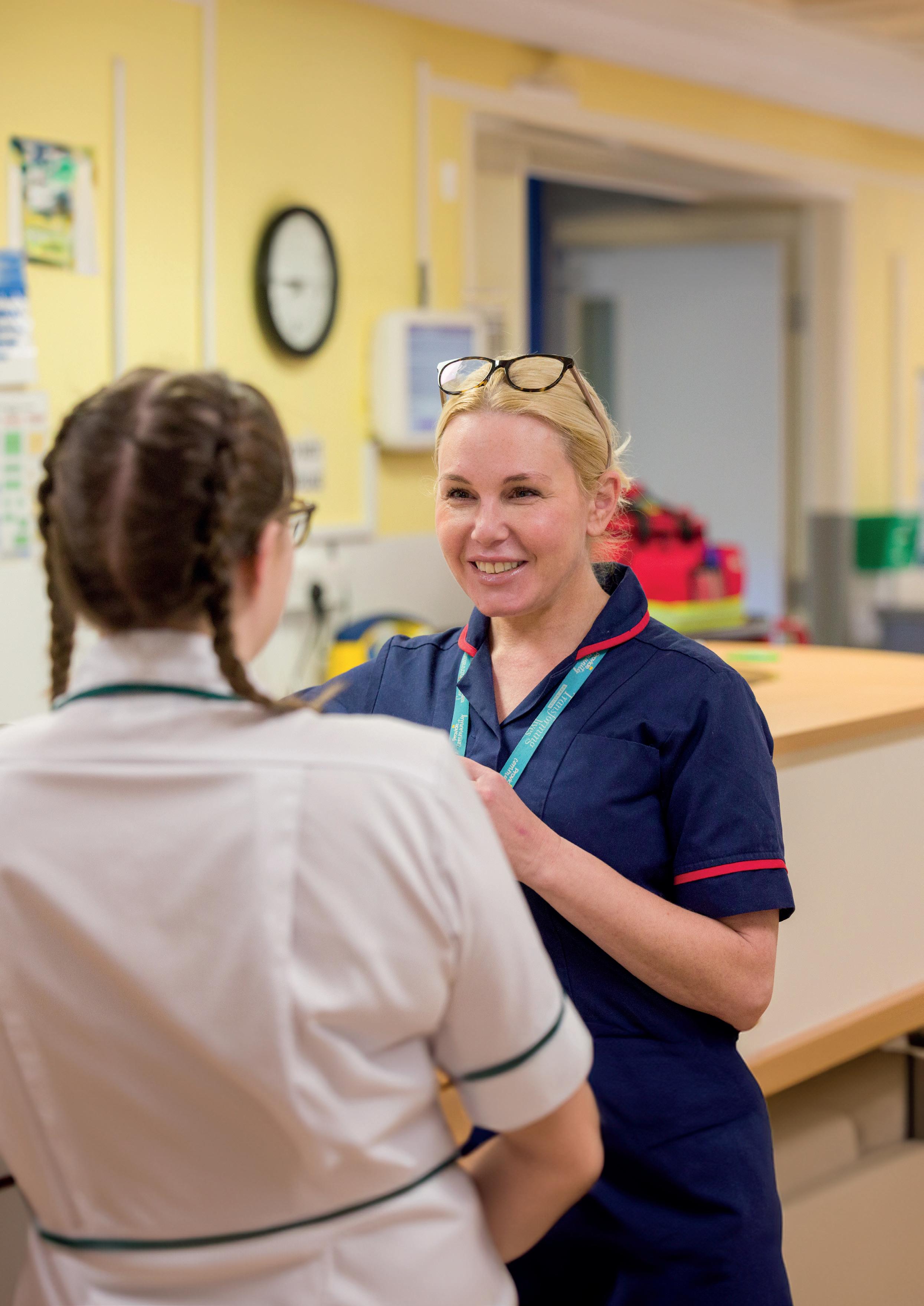
99 % of colleagues compliant with: ‘Freedom to Speak Up’ (whistleblowing) Training
We have an open and transparent reporting culture which encourages colleagues to identify and report incidents. We train all new employees how to do this at induction, encouraging them to report all incidents and near misses they identify so that we can monitor incident themes and trends to improve quality. All incidents and near misses that are reported are reviewed to consider what needs to be done to maintain safety and improve quality. We promote a fair and just culture to ensure colleagues are not afraid to report incidents and near misses and we actively engage with colleagues so they can be involved in the review and learning from safety incidents.
During 2024-2025 our colleagues continued to demonstrate a healthy reporting culture, detailing incidents and near misses that occurred within the organisation (we call these ‘Provide Source’ Incidents.) Additionally our colleagues reported any incidents and near misses they identified where another organisation’s care has impacted on the service user or their care or treatment plan. We encourage colleagues to do this so we can notify the other organisation so they can learn and improve their own services. An example of the sort of incident we would report concerning other organisations would be issues that may arise when a service user moves from another organisation into our care. At times the transfer may not be as effective as planned and there may be delays with the start of care packages, medication supply, provision of information about care plans or equipment. When this happens, our colleagues work hard to ensure any issues are addressed as quickly as possible to keep people safe. We then let the transferring organisation know there were issues with the transfer so they can prevent the same thing happening with other transfers in the future.
Overall, we report many types of incidents and near misses related to service delivery, care quality or safety, colleague safety, building or property issues, equipment issues, supply issues, safeguarding issues, information governance issues etc. Our ‘all incidents’ data combines the number of incidents reported as Provide Source as well as those arising from other organisations.

Provide Community Source Incidents by Level of Harm: Health Directorate
Of all the incidents reported from all sources, in 2024-2025, the majority (97.2%) resulted in no harm or low harm. 2.7% of incidents resulted in moderate harm. No severe harm incidents were reported and one death was reported which did not occur as a result of any care delivery or safety issues.
When an incident occurs, we review what happened so that we can take action to reduce the chance of it happening again. If an incident is more complex and has resulted in harm or has the potential to cause harm we may do a more in-depth review of what happened to find the learning to improve quality and safety. These more in-depth reviews we call Patient Safety Incident Reviews. Over the last year we completed 10 Patient Safety Incident Reviews. Learning from these incidents includes:
reviewing how we record test results in electronic record reviewing how we support people who do not wish to be admitted to hospital against clinical advice reviewing falls management in our community and virtual wards reviewing pressure ulcer support and care provided to an individual reviewing how we communicate information about care internally and externally
In our community services we support many people who are frail, older and have complex needs which puts them at higher risk of falling due to their physical health.
We work to support people to maintain their independence for as long as possible and this means we actively encourage people to stand, walk and move as much as they are able to maintain their stamina and strengthen their mobility. To minimise the risk or falls we undertake risk assessments and create plans with people to help them stay safe when moving. However, the risk of falling cannot be eliminated and some people in our care may experience a fall.
In 2024-2025 of all the falls incidents we reported, 99% resulted in no harm or low harm. Two falls resulted in moderate harm and we followed the NHS Patient Safety Incident Response Framework to identify learning from these events. The harms did not result from care delivery or care safety issues.
Service User Falls: Provide Community Source
In 2024-2025, we reported fewer falls than 2023-2024 and our falls rate is lower than the national NHS average.
Pressure ulcers are injuries to the skin and underlying tissue, caused by prolonged pressure on a part of the body.
They usually affect people with restricted mobility such as those confined to bed or who sit in a chair for long periods of time. Many of the people we care for are living in their own homes and have become frail with complex care needs and are, therefore, at much higher risk of developing pressure ulcers
Pressure ulcers form a large part of the all the incidents we report on our incident reporting system as we mandate the reporting of pressure ulcers whether they occurred in our care or not. The majority (72%) of all the pressure ulcers we report have developed before people are admitted to our services and we discover and report them as part of our admission processes. 28% of ulcers reported are pressure ulcers we report as developing or progressing while in our care. We call these ‘Provide Community Source’ pressure ulcers.
Category 1 Category 2 Category 3
Category 4 Deep Tissue Injury: Purple Unstageable: Depth Unknown Mucosal
Provide Community Source Pressure Ulcers by Category: Health Directorate
All Sources
Provide Community Source Provide Community Mean
Between April and September 2024, we used the following categories to record the stage of pressure ulcers: Category 2, 3 and 4, Deep Tissue Injuries and unstageable. In October 2024 we simplified pressure ulcer reporting in line with the National Wound Care Strategy pressure ulcer reporting guidelines. This change meant we stopped using Deep Tissue Injury and Unstageable as categories and reclassified these pressure ulcers as category 2 or 3 pressure ulcers and we added ‘mucosal’ as a category. Mucosal pressure ulcers occur on mucous membranes, like the mouth, nose, or genitals, and are often caused by medical devices.
No harm
Low harm
Moderate harm
When pressure ulcers are reported as developing or progressing while in our care (Provide Source), we investigate to see if there were any issues with care delivery or care safety that contributed to this happening. For the majority of incidents, the care provided is identified as appropriate and safe and the pressure ulcer has occurred for other reasons such as the progression of disease and frailty, or the person we are supporting may choose not to use the equipment provided or follow the advice given to reduce the risk of a pressure ulcer developing or progressing.
Of all the Provide Source pressure ulcers reported, 96% resulted in no harm or low harm, 4% resulted in moderate harm and 0% resulted in severe harm.
In 2024 we completed a focused review of all category 4 pressure ulcers that were reported and we listened to feedback from families about the impact these pressure ulcers had on the individual and the people caring for them. This helped us to identify a quality initiative to improve how we manage pressure ulcers and communicate with families and carers. Our improvement actions were:
delivering a pressure ulcer conference to share learning with clinicians and to provide refresher training on the recognition, management and prevention of pressure ulcers
implementation of PURPOSE -T a new pressure ulcer risk assessment tool
implementation of new pressure ulcer reporting categories
development and introduction of new Pressure Ulcer Prevention packs that are now used to keep people with pressure ulcers, their families and carers informed about the care in place and information about pressure ulcers and how to prevent them occurring or getting worse
The success of this initiative was recognised by our commissioners who have arranged for us to share what we have done with other health care providers.

We report and investigate all medication safety incidents. The incidents reported may be because of an issue with the supply, administration, prescription, or storage of medicines. The number of incidents reported are low and the majority (99.9%) result in no harm or low harm only. We have had no incidents which resulted in severe harm or death. We reported one moderate harm incident which was not related to care delivery or safety issues in Provide Community.
Our dedicated Medicines Management Team review all incidents related to medication and where an incident has occurred they support teams to learn from these to improve safety. They also work to prevent incidents by ensuring colleagues receive appropriate training, specialist advice and guidance to practice effectively. During 2024-2025 the Medicines Management Team worked with colleagues in our services to improve quality and safety. Some of the improvements are:
strengthening the way we store and manage controlled medicines and controlled stationery, improving practice through training, reviewing storage facilities and processes and through audit of practice and processes
reviewing prescribing practices and delivering prescriber training updates for non-medical prescribers rationalising stock and reviewing supplier contracts to reduce costs and improve availability of medicines at the point of care
working with Mid and South Essex Integrated Care System partners to review incidents associated with the handover of care between organisations providing care
Provide Community Source Medication Incidents by Harm Level: Health Directorate


The Infection Prevention and Control Team provides specialist advice and support to the organisation. They work closely with our Director for Infection Prevention and Control and our Consultant Microbiologist, to ensure the right systems and processes are in place to prevent and control infections in line with national standards, guidance, and legislation. The Infection Prevention and Control Team develop policies and guidelines, deliver training, provide expert advice and monitor compliance with standards. They also investigate when infections arise to see what can be learned to improve practice and service delivery.



To make it easier for services to maintain standards and keep up to date with infection prevention and control practice changes, clinical services nominate a member of their team to be their Infection Prevention and Control Link Practitioner in the workplace. These employees have a passion for infection prevention and bring enthusiasm and skills to support their colleagues with advice.
They help to monitor infection prevention and control compliance by completing audits and taking action to report and address any gaps in compliance. Link Practitioners learn and keep up to date by regularly attending the Link Practitioner Forum run by the Infection Prevention and Control Team.
In 2024-2025 the forum topics included updates on the use of the digital audit programme, information and learning about specific organisms and how to manage them and areas of focus such as hand hygiene practice and assessment, catheter management, and the safe practice for sharps handling and disposal. An area has been set up on Community Platform, our colleague intranet, which is regularly up-dated to provide colleagues with access to supporting information and resources.
99 % of eligible colleagues have completed Infection Prevention Training Level 1
All colleagues are required to undertake infection prevention training during induction, when they join the organisation, and then to complete refresher training in line with our mandatory training programme. The Level 1 course is for completion by non-clinical employees and Level 2 for clinical employees. The training is aligned to the UK Core Skills Training Framework for statutory and mandatory training for infection prevention and control.
93 % of eligible colleagues have completed Infection Prevention Training Level 2
Throughout 2024-2025 the Infection Prevention and Control Team have also provided colleagues with training in the how and when to use of personal protective equipment (PPE), including fit testing for enhanced respiratory protective face masks to ensure we remain business ready for dealing with respiratory infections of concern. To support the fit testing process, we have invested in new fit testing equipment to enable more colleagues to be fit tested and retested as needed.
Additionally, during 2024-2025 the Infection Prevention and Control team worked closely with the Estates and Facilities Team to train colleagues in preparation for the new NHS England Standards of Healthcare Cleanliness 2025.


A key role of our Infection Prevention and Control Team is to monitor for infections of concern. These are caused by organisms that are particularly harmful as there is high potential for them to cause serious illness or death. If an infection arising from an organism of concern is reported, the Infection Prevention and Control Team undertake a review, in collaboration with those involved, to try to identify why it happened and if there are any improvements to practice that are needed to prevent further cases and to learn from the event.
During 2024-2025 we identified two cases of Clostridioides difficile toxin (C Diff.) One was identified in the community and one in our community hospital ward. Both cases were reviewed to ensure the service users had optimal care and treatment to support their recovery and to identify any learning. In both cases no care delivery issues were identified.
In 2024-2025 there were high numbers of cases of Acute Respiratory Infections (ARI) being reported nationally. In response the Infection Prevention and Control Team monitored the situation in our local communities and ensured our colleagues were briefed and informed about the latest guidelines for the management of ARI and the appropriate infection control precautions to implement when supporting people with suspected or confirmed respiratory infections.
INFECTION SURVEILLANCE ORGANISM OF CONCERN
MRSA Bacteraemia
(Methicillin Resistant Staphylococcus aureus)
MSSA Bacteraemia
(Meticillin-Sensitive Staphylococcus aureus) C Diff (Clostridioides difficile)

COMMUNITY HOSPITAL WARD
Safeguarding means protecting the rights of children and adults to live in safety, free from abuse and neglect. Provide Community fully encourages and endorses that safeguarding is ‘everybody’s business’. In line with our statutory duty to protect people from abuse when we are concerned that someone in our care is being abused, we report this to the Local Authority who has the statutory responsibility to investigate and take steps to protect people from abuse.
In 2024, we made 192 referrals to the Local Authority. The Local Authority also received 17 referrals where individuals or other providers of care raised concerns about people in our care. We have investigated these incidents to review the care we provided and, where needed, to learn and improve our services. None of the incidents we investigated resulted in severe harm or death and our investigations found the care we provided was safe and appropriate. Nevertheless, we did identify some learning from these incidents to improve on quality which was fed back to individual colleagues or teams and the safeguarding team reinforced the learning in the refresher training they deliver to colleagues. Local Authority colleagues have commended Provide Community on the quality of the reports we provided to them that evidenced the quality of care delivered and the learning identified, where needed, from safeguarding referrals.
SAFEGUARDING REFERRALS MADE TO THE LOCAL AUTHORITY 2023-2024 2024-2025
Number of referrals made by Provide Health Services concerning individuals or other providers of care 195
Number of referrals raised by others against Provide Health Services 9
SAFEGUARDING TRAINING AND SUPERVISION COMPLIANCE 2024-25 (AS AT MARCH 2025)
Throughout 2024-2025 our level 4 trained Safeguarding Team have delivered advice, training and support to colleagues to ensure they are up to date and practice effectively. Safeguarding supervision is delivered in group sessions and colleagues are encouraged to attend. One-to-one supervision sessions are also provided to clinicians where needed to develop their skills and knowledge through reflective practice and discussion.
Supervision is also completed informally when the Safeguarding Team visit services or connect with colleagues virtually to support with enquiries and complex case management. Every opportunity provides safeguarding supervision and learning support to our teams so they build their skills and confidence in this area in real time practice.
This was evidenced when our Suffolk Sexual Health Service underwent a quality assurance visit from our commissioners who noted that: safeguarding supervision was in place quarterly and as needed for individual cases via the safeguarding lead. They also noted that training is at appropriate levels for all team members and learning was reflected in conversations during their visit. Across all the Sexual Health Teams they visited, colleagues reported that there was good safeguarding support provided to the service by our Safeguarding Team.

Your care, treatment and support achieves good outcomes, helps you to maintain quality of life and is based on the best available evidence.
Having competent colleagues delivering care is a key requirement for the provision of safe and effective services. We therefore mandate a wide range of training appropriate to the role people have in the organisation and we monitor colleagues compliance with training and training updates.
MANDATORY TRAINING PROVIDED
Dementia Awareness
Oliver McGowen Learning Disabilities and Autism
Display Screen Equipment
Basic Life Support and Anaphylaxis
Equality and Diversity
Listen Up (Freedom to Speak Up) for line managers
‘Freedom to Speak Up’ (Whistleblowing)
98 % of eligible colleagues have completed the Oliver McGowen Learning Disability and Autism e-Learning Training
Health and Safety
Moving and Handling
Information Governance
Conflict Resolution
Patient Safety
Safeguarding
Infection Prevention
Fire Safety
90 % of colleagues have completed the Mandatory Dementia Training
In addition, we support colleagues to undertake wider training opportunities to help them develop more expertise in their role and to support their personal development. We like to see our colleagues grow and thrive in their role and we hope that many will go on to work in more senior roles in our organisation.
Catheterisation
Venepuncture
Cannulation and Infusion Therapy
Palliative and End of Life Care
Frailty
Bladder and Bowel Care
Transcribing
Non-Medical Prescribing
Diabetes
Injectable Medicines
Clinical Supervision
Report Writing
Pre-registration Student
Consolidation Workshops
NMC Practice Assessor and Practice Supervisor Updates
Nurse Verification of Expected Death
We are passionate about helping our colleagues to learn and achieve formal qualifications. We provide clinical placements and mentoring for university students undertaking nursing, allied health professional or non-clinical training. We also support a wide range of apprenticeships. During 2024, Provide Community supported 26 colleagues within Provide Health to undertake an apprenticeship in a variety of clinical and non-clinical programmes, five have now successfully completed their programme with the remainder continuing with their studies. Apprenticeship programmes range across 12, 18 and 24 months depending upon subject and level.
Those who have completed their apprenticeships are:
1 Assistant Practitioner Registered Nurse
1 Assistant Practitioner Speech and Language Therapist
1 Advanced Clinical Practitioner
1 Registered Nurse
1 Nursing Associate
Throughout 2024-2025 bespoke training has been purchased to enable colleagues in the delivery of service.
Training courses that have been completed by colleagues include:
University modules – Clinical Assessment Skills, Non-Medical Prescribing
Post Graduate Diploma - District Nurse Qualification
Advanced Clinical Practice MSc
Trauma Informed Practice in Adult Safeguarding
Blood Result Interpretation
Advanced Pulmonary Rehabilitation
Occupational Performance Coaching
A total of 243 pre-registration students were placed in Provide Community from nursing, AHP and medical programmes. This totalled 1,097 weeks of supervised learning. This was a significant increase on the year before when we supported 126 pre-registration students, totalling 823 weeks of supervision. We would like to acknowledge the hard work and commitment of our clinicians who provide the care, support and supervision to all these students so that the next generation of clinicians are well trained and effective practitioners.
Provide Community has delivered three pre-registration nursing student inductions for the University of Essex and Anglia Ruskin University, and this will continue for every intake per university. These events are to welcome and introduce students to Provide Community, addressing any concerns and to include input from relevant university colleagues. A student welcome handbook is also sent prior to induction.
243
1,097
Learning and Development Week, held in May 2024, was a resounding success. The event attracted a total of 2,046 participants which was a 58% increase in bookings compared to the previous year - a testament to the growing interest and engagement in our development programmes.
The diversity of the workshops ensured there was something for everyone. Key highlights included Ant Middleton, our keynote speaker, renowned for his role in ‘Who Dares Wins’, and our creative lunchtime workshops.
Feedback from attendees was overwhelmingly positive. Participants appreciated the variety of sessions and the opportunity to develop their knowledge and learn new skills in a supportive environment.




In 2024-2025 we limited the number of clinical audits undertaken to focus on bedding in our new incident reporting system and implementing the new Patient Safety Incident Framework. We completed the following audits:
Colleague Awareness of NICE Sepsis Guidance in Urgent Community Response Service
Falls Virtual Frailty Ward
Invasive Group A Streptococcal (iGAS) Control Measures
Patient Reported Outcome Measures (PROMs) in Muskuloskeletal Physiotherapy
PICC Line Medication Safety
National Early Warning Score (NEWS2)
Venous Thromboembolism (VTE) Prophylaxis
Insulin Incidents
At Provide Community, we are proud to have developed a team of Professional Nurse Advocates (PNAs) over the past three years. PNAs are registered nurses that have undergone a training programme sponsored by NHS England to equip them to provide restorative clinical supervision to their colleagues. The PNA role aims to build on the personal and professional clinical leadership of nurses which enhances the quality of care they provide to people in their care. It is a great way to support the wellbeing of our workforce and it is viewed very positively by our colleagues. Our PNAs offer set monthly sessions that colleagues can attend for support and they work one-to-one with colleagues that may want a more confidential session. Our PNAs have developed networks with PNAs in other organisations and attend key events such as the East Region PNA Conference and Making PNA Sustainable: Learning, Supporting and Growing Together conferences to maintain their knowledge and skills.

96 % of colleagues compliant with: Information Governance Training

Information governance is how we ensure we look after the information people share with us about themselves. We want to maintain the trust people put in us to keep their information safe and we work to continually improve the security of information and records we keep.
As such, a robust Information Governance Framework is in place with accountability provided by our Senior Information Risk Officer, working closely with our Head of Information Governance and Data Protection Officer, Caldicott Guardian and Director of IT Services. We recognise the ever-changing threats to information and information systems, so we regularly carry out effective monitoring and reviews of our systems, policies and procedures, making any necessary changes and updates as required.
In 2024, we invested in a full-time Information Governance Compliance Officer position to ensure we continue to improve and maintain a best-in-class information governance and data protection service across the organisation. As a result of feedback and lessons learnt from incidents, we plan to implement a new user-friendly platform in 2025, that will help simplify data protection compliance and empower colleagues to manage data protection and privacy risks effectively while enhancing awareness and accountability.

We undertake an annual self-assessment of our compliance against the Data Security and Protection Toolkit which assesses our performance against the National Data Guardians 10 data security standards. The last submission of the information governance toolkit took place in June 2024, and we achieved a scoring of ‘Standards Exceeded’. We are on track to achieve the same standard in the June 2025 submission.

Any errors or incidents concerning the handling, use or storage of person identifiable information is recorded, and we take action to investigate these and learn from them. All incidents are risk assessed and, where an incident involving personal data occurs, and is likely to result in a risk to the rights and freedoms of individuals, this is reported to the Information Commissioners Office and is investigated to identify learning to improve our systems and practices if needed. In 2024-2025, there was only one reportable incident involving personal data which was reported to NHS England and the Information Commissioners Office. The Information Commissioners Office found Provide Community to be compliant with regulatory reporting requirements for this incident, were satisfied with how we had dealt with it, offered some advice on how to further improve our processes, and then closed the case.
To ensure we minimise the risk of information governance incidents occurring, our colleagues continue to take mandatory annual information governance refresher training, following the initial mandatory training completed upon joining the organisation. A series of information governance best practice and awareness messages were communicated to all colleagues during 2024 via various methods including our weekly internal communication newsletter, Information Governance Champions Network, periodic information governance newsletters and computer lock screen displays. We are currently developing an in-house anti-phishing tool to be used alongside the existing annual simulated exercise conducted by NHS England. The new tool will enable us to run more sophisticated phishing simulations, helping us keep pace with the increasingly advanced phishing attacks used by hackers.
As part of the NHS Emergency Preparedness Resilience and Response (EPRR) Framework, providers and commissioners of NHS-funded services must show they can effectively respond to business continuity, critical and major incidents while maintaining services to patients. The NHS Core Standards for EPRR sets out the minimum requirements expected of providers of NHS Funded services in respect of EPRR. On an annual basis, Provide Community is assessed by our commissioners (Mid and South Essex Integrated Care Board) for assurance that we are meeting the required standards. As part of the annual review process, it was agreed that Provide Community is fully compliant, having reached 100% against the 2024-2025 Core Standards for EPRR. Mid and South Essex Integrated Care Board also noted that:
‘EPRR appears to be well embedded within the organisation at all levels, with excellent engagement from the Accountable Emergency Officer and all directorates, and with existing plans being well exercised and tested, and the on-going training provided to colleagues in leadership positions appears to be comprehensive. Good practice is reflected in Provide Community’s Governance, backed by comprehensive record keeping, documentation and review processes.’

Staff involve you and treat you with compassion, kindness, dignity and respect
In this section you can see how people rate us using the Friends and Family Test survey and we report on the number of complaints we receive.


Our goal is to involve and treat people with compassion, kindness, dignity, and respect. Our service users are central to everything we do. Transforming lives through care, innovation and compassion is at the heart of our culture and we do this by listening to our service users and being responsive to the feedback they give us. We empower our colleagues to improve our services dynamically, making changes where needed based on feedback we receive.

We encourage our colleagues to hear the service user voice, to understand their lived experience, so we can tailor their care according to their needs and preferences.
We do this day-to-day as we provide care but we also try and capture their feedback through surveys which we have available for people to complete if they wish to tell us about their experience. We understand that learning and improving from the experience of patients, carers and families is fundamental to the delivery of high-quality care. In February 2025, we welcomed a new employee to our organisation as our engagement lead. Their role will be to help us build on the ways in which we engage with, hear from and collaborate with service users so we can understand their lived experience and engage with them according to their needs.
Customer Feedback:
‘Just want to thank you and your team for the effort and care in the healing of my leg. Now I am able to continue with the prosthetics.’
(ICT Maldon
January 2025) Customer Feedback:
‘Massive thank you for my foot operation. From start to finish the care & treatment received was amazing. I am now pain free and you can’t even see the scar. I can’t believe how quick I healed and was virtually pain free by the next week!’
(Podiatric Surgery May 2024)
When people use our services, they have the opportunity to complete a survey called the Friends and Family Test (FFT). The FFT survey asks people to rate their overall experience of the service they used. Not all the people who receive care or treatment complete the survey, as it is voluntary, but we appreciate it when they do as it helps us identify areas where we can improve our services.
In 2024-2025, 96% of people who completed the FFT rated Provide Community’s services as ‘good’ or ‘very good’, compared to 94% reported by NHS England for community providers in January 2025.
When people complete the FFT survey we also ask: if they felt they were treated with dignity and respect if they felt involved in their care plan and goal setting as much as they wanted to be if the care received felt personal and met their needs
99% of people who completed the FFT survey reported that they were treated with dignity and respect and 98% felt their care was personal and met their needs. 93% felt involved in their care plan and goal setting.
Specifically in our Community Hospital Inpatient ward, we asked people to tell us about their experience and 99% of the people we asked said they felt safe on the ward and 97% felt they were treated with dignity and respect. Where people responded with a ‘no’ to our FFT questions, the reason they gave for their answers were ‘no comment’ or ‘not applicable’.



96 % of people rated their experience: ‘Good’ or ‘Very Good’

When things go wrong, we encourage our colleagues to be open and honest, ensuring people receive an explanation about what has happened and, where appropriate, to provide a meaningful apology as we work with them to put things right.
We use the learning from complaints to improve our services. All complaints we receive are reported to the service manager and the relevant Chief Officer responsible. Our Board receives regular reports on complaint themes and trends.
As an example of how we respond to feedback from service users and colleagues, we completed a review of the availability of nurses to support people overnight in the community. This led us to take action to review the working patterns of our community nursing colleagues so that we could make more nurses available overnight.
The aim of the review was to reduce variation and to standardise shift patterns so that we could focus on getting all the planned work completed before 8pm each day. This meant our out of hours colleagues could focus solely on responding to emergency unplanned calls after 8pm. We consulted with our community nursing teams who were responsive to the changes proposed and they have now moved to the new working patterns.

This change has been positively received by service users as we now routinely get the planned work completed before 8pm and there are now two teams working out of hours, instead of one, to support people and their families overnight.
In 2024-2025, we completed a review of our complaints policy which sets out our approach to how we respond to complaints and learn from them. We have also revised our complaints leaflet to provide more information on how people can share their experience of the care they received and how to contact the Customer Engagement Team to raise a concern, complain or share a compliment.
In 2024, our complaint numbers remained low, in line with previous years. Overall, we experienced a decrease in the total number of complaints received compared to 2023.
Below are some of the compliments we have received about our services:
Assessment and Rehabilitation Service (April 2024/FFT)
‘Everything was incredibly perfect in terms of reception, commitment to patient care, eagerness to help and professional competence.’
ENT / Audiology (April 2024/FFT)
‘Consultation was quick and professional doctor was lovely very easy to talk to and gave me answers to My problem in a caring and professional way.’
Halstead Ward (May 2024/Compliment)
‘It is with sincere thank you and gratitude to see all the ‘team members’ caring for mum. A very friendly welcoming professional team which has made our mum feel safe, cared for in a happy environment.’
Dermatology Service (June 2024/FFT)
‘Very quick to receive an appointment when I had to change it and staff were helpful to rearrange. Hospital and waiting room were clean and welcoming. Seen on time, friendly staff, seen quickly and efficiently and put at ease.’
Out of Hours (September 2024/Compliment)
‘Daughter thanked the service for the care given to her mother when visited following discharge from hospital. Mother’s referral had been sent to the wrong team and service went above and beyond to sort out a referral and replenished patient’s syringe driver. Service also went back with further dressings for her mother. Family grateful for all the kindness shown.’
Children’s Physiotherapy (September 2024/FFT)
‘Physiotherapists were exceptional. They built a lovely relationship with my twins to gain their trust. They identified quickly what was wrong and provided solutions and reassurance.’
Bayman Ward (October 2024/FFT)
‘I shall be forever indebted to the wonderful staff for the care extended to me. Their close attention was so reassuring and was a major reason for my early recovery.’
Dermatology Service (November 2024/FFT)
‘I received a warm welcome at the main door and given clear direction to where I needed to go. Clean and tidy hospital.’
Essex Sexual Health Service (November 2024/FFT)
‘Once I was contacted to arrange my appointment it went well and I received regular reminders. The staff who were present on the day were excellent, staff were professional and did a very good job!’
Suffolk Sexual Health Service (November 2024/FFT)
‘The nurse I saw was so kind, I was scared I was wasting her time but she was super reassuring and helpful and I feel much better knowing that if I need support in the future I can see someone professional but kind.’
Children’s Continence and Enuresis Service (January 2025/FFT)
‘Our daughter was dry in less than a year, she feels confident about sleeping through and is now able to get up to go to the toilet. Very good in giving advice to parents.’
Wheelchair Services (March 2025/FFT)
‘The rehab engineer was very professional and understood my situation and saw me as a person as opposed to a set of wheels or another number. The service was tailored to my needs. Communication was effective at all points. He was highly respectful.’
Services are organised so they meet your needs

At Provide Community we deliver services to people in their own homes if they are unable to attend clinics. We also deliver services in clinics and village halls as well as in hospital settings and virtually.
To improve access and reach more people in 20242025, we used a mobile clinic van to reach people in their own neighbourhoods. We utilised new head wear technology to trial delivery of virtual care in care homes. We reviewed our operating hours in our Sexual Health Service in Suffolk to make clinics times more flexible to meet service user needs. Our Mid Essex Recovery College service co-produced courses with service users and this method of engagement really enabled people to access the support they needed in the most accessible way for them.


The Mobile Delivery Project 2024-2025 was an exploration into the impact of mobile service delivery on health inequalities, and the benefits of shared use and collaboration of services. Since inception in April 2024, Provide Community services and external partners have used the Mobile Delivery Unit (MDU) to engage with underserved and seldom heard communities across Mid and South Essex. There is clear evidence that the flexible and shared element of the MDU has fostered collaboration between services, enabling them to strengthen relationships and increase and improve community engagement, with the associated social return on investment for 2024-2025 over £285,000.
For 25/26, the project will be funded by Essex County Council, with first refusal for The Essex Wellbeing Service and Essex Sexual Health Service specialist Outreach and Education teams.
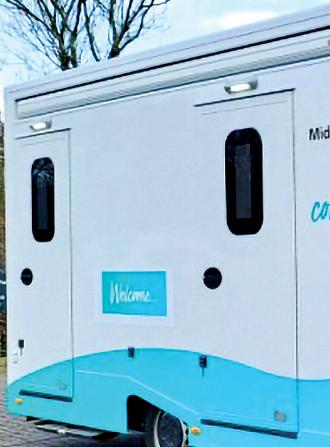
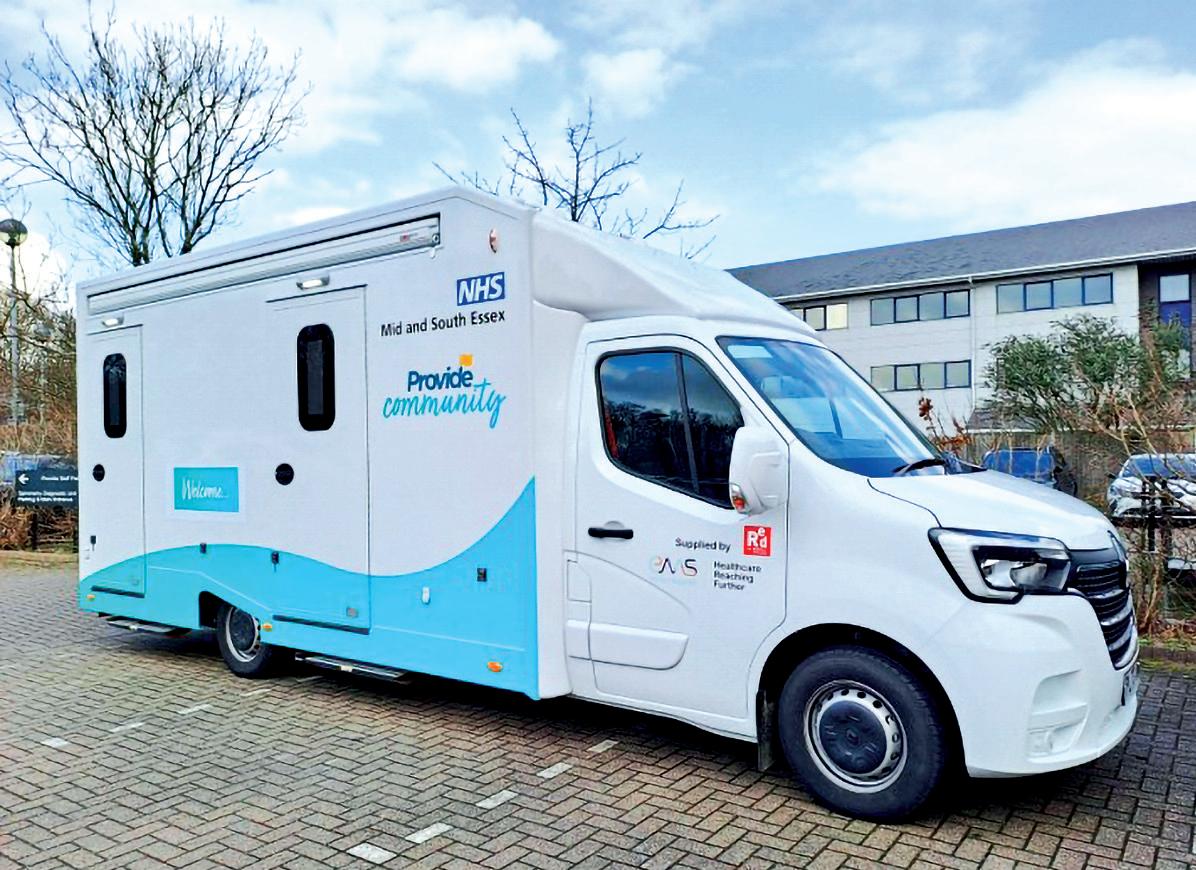
Mid Essex Recovery College
is a service that delivers a comprehensive range of free workshops and courses, that cover practical and creative topics, to support mental health recovery

Mid Essex Recovery College co-produces and co-delivers its courses and workshops with the involvement of the service users and community agencies so that they are designed and delivered in a way that meets the needs of the people who use them. In 2024-2025 the service expanded its co-production work, enhancing student and partner engagement, and adapting its service offer based on community feedback. This has resulted in a substantial increase in the number of courses timetabled, demonstrating their commitment to meeting the educational needs of the community.
A strategic focus on online course delivery also contributed to a significant rise in course offerings, particularly in the latter half of 2024. This shift towards digital learning formats has proven highly popular, aligning with broader educational trends. The team are keen to reach people in all areas and they have set up sessions in Maldon, the Dengie, South Woodham Ferrers and Halstead to further their reach. Throughout 2024-2025 the number of sessions planned and delivered consistently increased across the year and the team were pleased to welcome rising numbers of new students as a result of active participation in events such as Maldon UFest, Fella’s Fair at Essex Cricket Ground, and having a regular presence at neighbourhood meetings. We cater for specific community needs and support for the homeless. Courses are run from a total of 32 different venues across the Mid Essex area such as village halls, church halls and cafes.
As part of the redesign of Suffolk Sexual Health Service, the service hours of operation were reviewed as it was recognised that the hours offered did not provide enough flexibility for service users.
The Suffolk Sexual Health Service Outreach Team conducted a survey regarding opening hours and access to the service worked with relevant stakeholders so that the new hours were co-produced. This resulted in new hours of operation being implemented from February 2025. The service now offers early appointments from 8am, evening appointments until 8pm and Saturday morning appointments across all three clinic sites. Early reports indicate that service users are finding this beneficial.
This new application equips care home colleagues with the headset to enable virtual assessment and support by clinical teams. Pre-pilot exploration with two care homes has shown clear value including supporting safe delegation of clinical tasks, reducing delay to treatment, reduced travel and care home staff development. There is significant return on investment potential at 126%, and a six week pilot involving five care homes is being planned for the first quarter of 2025-2026.

The service delivers a range of services to provide holistic support for residents, through lifestyle services and community support to help people make positive social connections. Some of our achievements can be seen over these two pages.

In line with NHS requirements, some of the services we deliver are measured against the NHS 18 week waiting time standard, where people referred for assessment and treatment should be offered an appointment within 18 weeks.
In 2024-2025, we have seen a 6% growth in demand for our services which has contributed to longer waiting times in some of our service areas. The majority of our services are working within the 18 week standard but some services continue to experience longer waiting times. We have worked to improve this over the last year and have seen a 50% increase in the number of services we deliver that have waiting times of 18 weeks or less so we are making progress. One of the ways we are doing this is by working in collaboration with Essex Partnership University NHS Foundation Trust and North East London NHS Foundation Trust to align our service delivery, utilising the combined expertise of our teams to maximise quality and access to our services.
WAITING TO BE SEEN AND TREATED:
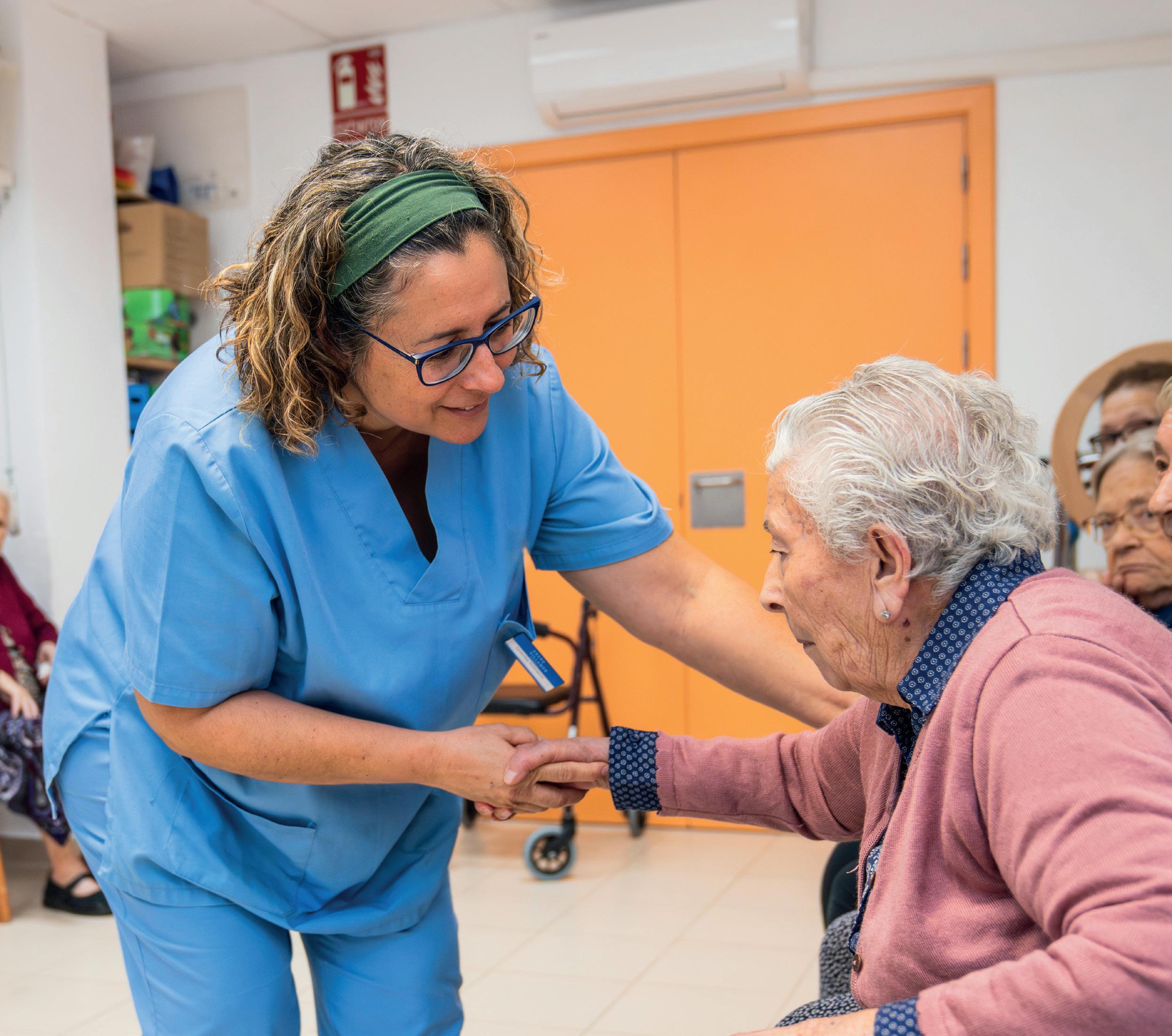

The leadership, management and governance of the organisation make sure it’s providing high-quality care that’s based around your individual needs, that it encourages learning and innovation, and that it promotes an open and fair culture.
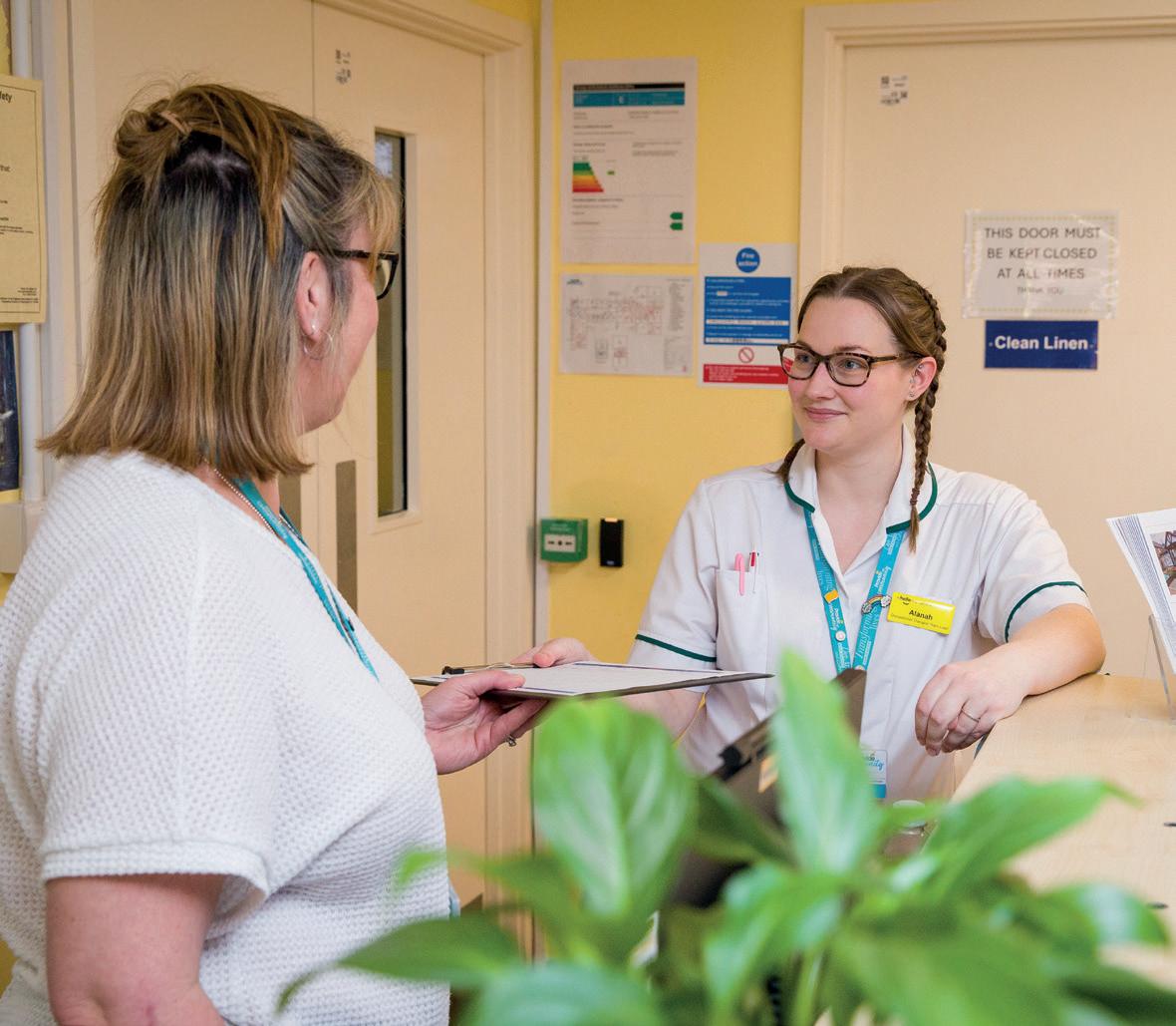
High-quality, safe and effective care is delivered by colleagues who feel valued and motivated and who feel supported to stay well and keep their skills up to date
In recognition of this, the Board sets in place the systems and structures needed to support our colleagues to perform well, promoting a positive culture of leadership that ensures our colleagues get the support and development they need.
The following pages provide some examples of how we supported colleague development and wellbeing during 2024-2025.
2025 saw the launch of the Provide Leadership Academy, a talent programme aimed at growing individuals with the critical leadership skills, insights, and resilience necessary to excel as leaders within Provide Community. Delegates selected for the programme were nominated by their line managers and endorsed by the Senior Leadership Team, recognising their potential as promising talents within the organisation. The inaugural cohort comprises 11 delegates, with six participants from the Health Directorate.

Employee Ownership Day was celebrated on Friday 21 June 2024 and was marked by the distribution of colourful nubuck notebooks for every member of Provide Community. The gift, which included the strapline ‘It’s not just my job, it’s my business’ boosted colleagues’ pride in being an employee owned organisation and signified the collective commitment to the company’s success. This initiative was carried out in collaboration with our Council of Governors and was received with enthusiasm across the organisation.
It’s not just my job, it’s my business!
Health and Wellbeing Week is an annal week of activities designed to promote colleague wellbeing, covering a broad range of activities. In 2024 Health and Wellbeing Week sessions included:
Dr Amir Khan’s ‘The Doctor Will See You Now’
Sleep Quality
Smart Air Frying
Nutrition and Wellbeing
Sitting Posture for Safer Working
Menopause
Food as Medicine
Eye Health

Seated massages were available at various locations and an ‘Immunity Boost Bar’ was set up at seven of our sites across Mid-Essex. Additionally, treats were delivered to our service locations outside of Essex including: Provide React Homecare across Yorkshire, Suffolk Sexual Health Service, Mind Professionals in Cambridge and Child Health Information Service in Dorset. A total of 1,942 immunity boost drinks, protein snacks and ‘Freedom to Speak Up’ whistles were also distributed.
We extended the invitation to attend to our colleagues in the acute hospital, North East London NHS Foundation Trust, Essex Partnerships University NHS Foundation Trust and Mid and South Essex Integrated Care Board and were pleased to have 388 bookings from our partnership organisations, compared to 42 in 2023.




We introduced Schwartz Rounds to the organisation in October 2023 and over the last year have been embedding them into practice. Schwartz Rounds are a practical tool that health and social care providers can use to improve the culture of their organisation and to support employee wellbeing and resilience. Schwartz Rounds provide a multi-disciplinary forum that brings together and supports colleagues from all areas of the organisation, to discuss the non-clinical, social, and emotional aspect of caring for people. They offer a safe confidential environment for colleagues to share their stories and experiences. The underlying premise is that there is an interwoven relationship between colleagues and service user experiences.
The sessions are available on a monthly basis to all clinical and non-clinical colleagues working across the Provide Community Group through a hybrid model of face-to-face or virtual meetings. Examples of topics covered in 2024-2025 include:
When change is constant Service users who are challenging Unfinished business – What comes next?
Hindsight is a wonderful thing. An experience I’ll never forget Protecting yourself from unwelcome attention via social media
Are we too busy?
Behind the scenes and screens
Our Schwartz Round attendance is growing and feedback from our colleagues has been very positive. Participants have reported:
‘I thought it was an excellent Round providing a varied insight into different people’s experiences in their roles. It was important to me to share my little story as a non-clinical person to clinical staff, which I hope was valuable.’
‘I really enjoyed today’s session. The 2 main ‘take aways’ I had were: Staff really do care about their patients and the care they give. They are not just numbers or tasks. I was very gratified to hear that even senior managers (who probably do a lot of administration/planning/staff management) still see themselves primarily as Nurses and continue to be defined by the expectations of that chosen vocation.’

‘I found the session really encouraging to hear what dedication and compassion is given through acts of human interactions that can also have the ability to produce some very difficult situations and outcomes.’
‘Excellent way to reflect on challenges faced in the clinical practice.’
‘Excellent insightful Round. Good to hear “another person’s perspective through the stories’
‘Very emotional session and in line with destigmatising having and sharing experiences, Thank you.’
We are developing a network of colleagues willing to be trained to become Mental Health First Aiders to support colleagues with their mental health. Mental Health First Aiders are not trained to be therapists or psychiatrists, but they can offer initial support through non-judgmental listening and guidance. Our Working Well and Essex Lifestyle Service are working in partnership to embed Mental Health First Aider training within our organisation and encourage colleagues to talk more freely about mental health, reducing stigma and creating a more positive culture. In 2024 we trained three new Mental Health First Aiders, delivered refresher training to six colleagues and overall, 710 supportive conversations were delivered by this team.
In 2024-2025, our Workplace Health Champions played a vital role in supporting colleagues wellbeing by developing and delivering a diverse range of engaging activities. As volunteers, our Workplace Health Champions helped create a positive culture of health and connection across the organisation through fun, inclusive, and accessible wellbeing initiatives. Over the course of the year, 619 colleagues took part in 422 unique engagements. Activities were delivered virtually and in person. The top five most popular activities were:
The Big Team Walking Challenges
Working Well talks and Social Care Inductions
Themed Virtual Quizzes
Seated Massage Sessions
and Essex Working Well Guest Speaker Sessions
Feedback from colleagues highlighted the value of these initiatives:
‘The seated massages are amazing – just 10 minutes of those magic hands can leave you feeling much calmer and grounded and ready to tackle anything. It also got me moving and interacting with others. Thank you!’
‘I enjoy taking part in all of the walking challenges as it helps to give me motivation to be active.’
‘It was nice to be able to connect with my fellow Working Well Champion colleagues and people I have never met before from Provide Community.’
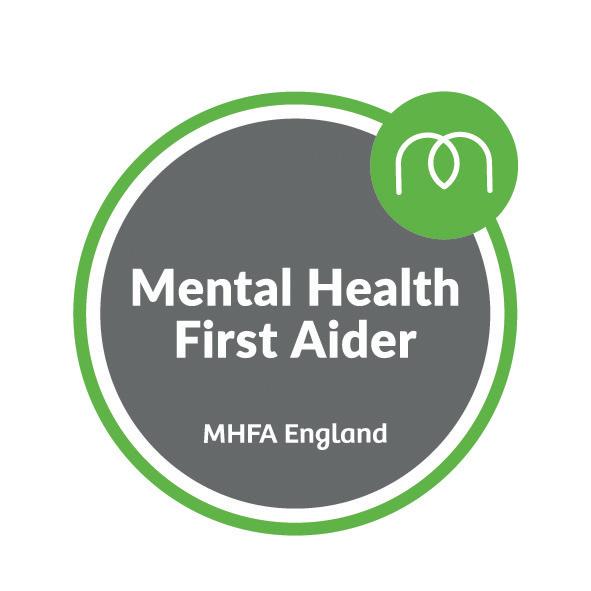
98 %
of our colleagues said: ‘In my organisation colleagues from all backgrounds and identities are valued’
Our Board is committed to working with all colleagues to ensure they have the tools and support they need to do a great job and to ensure that service users are cared for in safe environments by competent, appropriately trained employees. Their focus is on ensuring health, safety and wellbeing is prioritised and that being able to speak up and report concerns is encouraged and treated positively.
As well as speaking to colleagues directly, the Board shares information and encourages feedback regularly through webinars, news bulletins, and meetings. In addition, all new starters have a personal appointment to speak to a member of the Board in their first six months of starting in post to have a conversation about their experience. This enables the Board to gain fresh insights which informs learning and improvements in care quality, safety, systems and processes. An annual colleague engagement survey also provides colleagues with the opportunity to give their feedback to the Board.
Our 2024-2025 annual colleague engagement survey demonstrated that our organisation puts service users at the heart of what we do and our colleagues are proud to work for Provide Community and are willing to go the extra mile. Our colleagues would recommend our organisation as a place to work and as a place for their families to receive care if they need it and they recognise the importance of promoting a safety culture by being aware of the purpose of the Freedom to Speak Up (whistleblowing) policy. In our colleague engagement survey we asked, ‘Which three words would you use to describe the culture in your organisation?’
Here are the top answers:
95 % of our colleagues said: ‘I would recommend my organisation to friends and family if they personally needed treatment or care’
98 % of our colleagues said: ‘I am aware of the ‘Freedom to Speak Up’ (whistleblowing) policy’
The table below sets out some key questions we asked our colleagues in our annual colleague engagement survey. The survey was carried out by a company called ETS who provided us with some benchmark data to compare ourselves against other employers. We also show how we compare to the national NHS staff survey where similar questions were asked.
To friends and family I would recommend my organisation as a great place to work
I would recommend my organisation to friends and family if they personally needed treatment or care
I am proud to work for my organisation
My organisation puts patients /service users / customers at the heart of what it does
In my job, I am willing to go the ‘extra mile’
In my organisation, I feel empowered to do my job well
My Line Manager/Supervisor is visible
My Line Manager/Supervisor is approachable
At work my Line Manager/Supervisor is quick to respond if I show signs of being under too much pressure
I feel like a trusted member of my organisation
My organisation really cares about my personal health and wellbeing
-
-
-
-
-
-
In my team we challenge each other to think and do things differently to meet the needs of our patients/ service users/customers -
My organisation actively encourages sustainable ways of working
I have the right tools and technology to undertake my job
Where I work, colleagues take responsibility for complying with Health and Safety rules and procedures -
At work, I am aware of how to report an abusive / violent incident or near miss
I am aware of the ‘Freedom to Speak Up’ (whistleblowing) policy
In my organisation, it is safe to speak up and challenge the way things are done
In my organisation colleagues from all backgrounds and identities are valued
In my organisation colleagues would raise concerns about disrespectful, discriminatory, or abusive behaviours if they witnessed them
In the last 12 months I have NOT experienced discrimination from my Line Manager / Supervisor
In the last 12 months I have NOT experienced discrimination from patients / service users / customers / relatives or the general public
Here is what some of our colleagues have to say about our organisation:
‘I have been with Provide Community for nearly 15 years, and it is by far the best company I have ever worked for, and I would not consider moving elsewhere in the same role. Like any Organisation, (my history in in the private sector), there are challenges and the necessity of constant change, but being part of something where I feel I have a chance to make a difference makes any upheaval worthwhile.’
‘My manager and supervisor are approachable and supportive.’
‘Coming to Provide Community was a breath of fresh air in term of how I am valued, and my work is appreciated and considered important. It has been a great improvement in my physical and mental wellbeing having joined Provide Community, while being about to do a job I am passionate about.’
‘Really enjoy working for Provide Community. I have only been here a year, and my confidence has grown immeasurably.’
‘I feel Provide Community values their employees and take care to ensure we feel supported.’
‘I feel strong leadership from our service leads. They are present and communicate well.’
‘The weekly summaries and the monthly All Colleague Webinar are very informative, and I enjoy hearing what the other departments are doing and how the company is moving forward with its ideas. This is a platform to find out what other options are available for services users.’
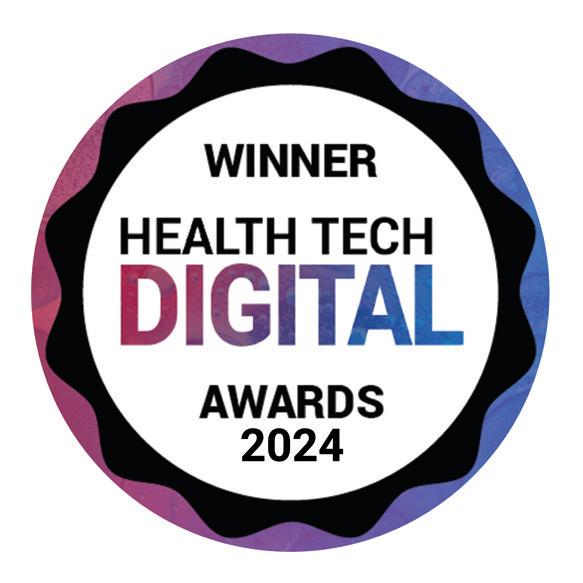


Winner – Health Tech Digital Awards 2024
Best Healthcare Information System
ImpactEQ - Provide Digital
Winner – Health Tech Digital Awards 2024
Best Solution for Community Care
Virtuward – Provide Digital
Essex Business Awards 2024
Business to Business award
Essex Working Well
Winner – Business Culture Awards 2024
Building a Culture of Innovation award
Highly Commended – Business Culture Awards 2024
Building a Culture of Innovation award

Highly Commended – Institute of Directors Awards 2024
Public and Third Sector Director of the Year award
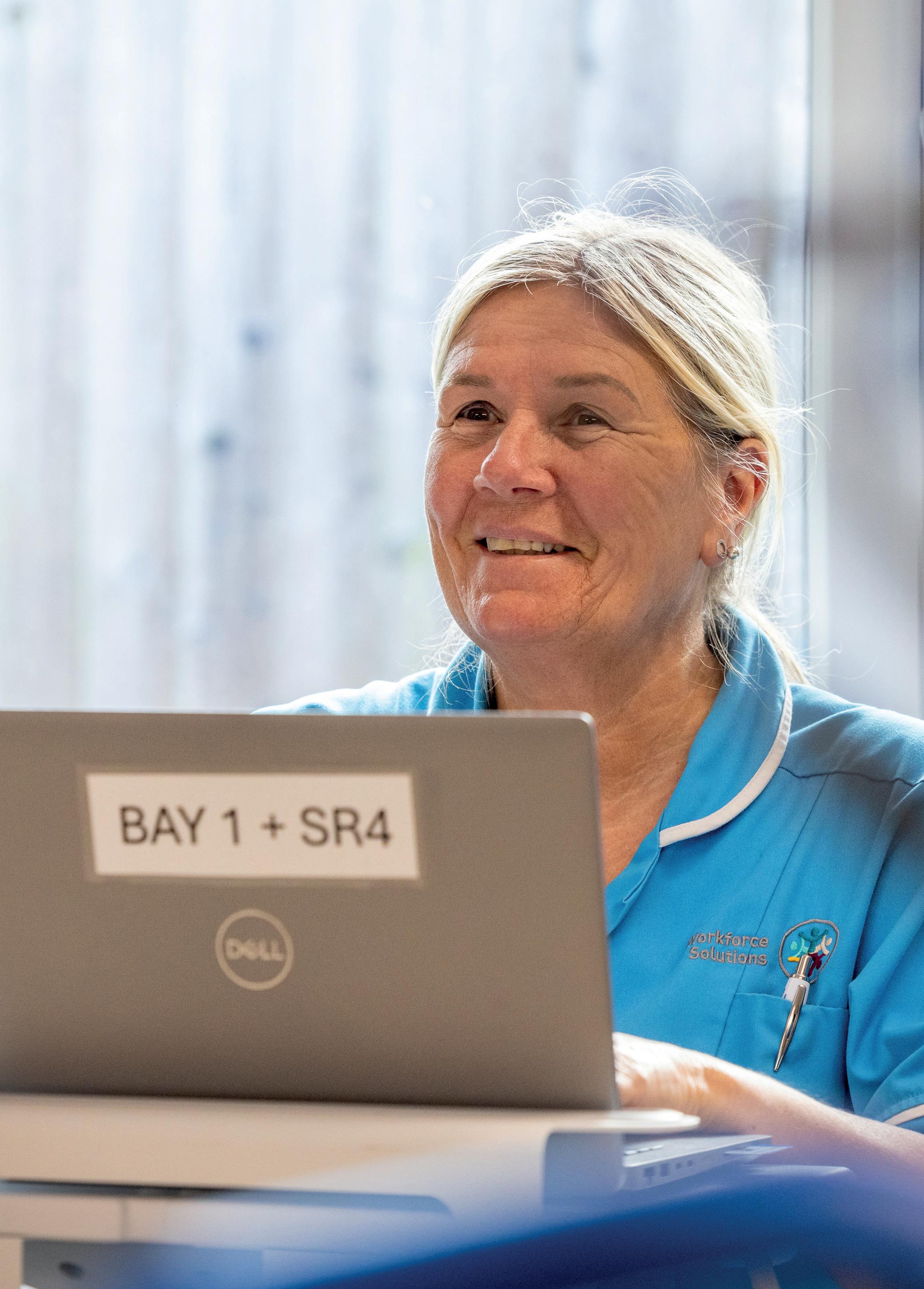
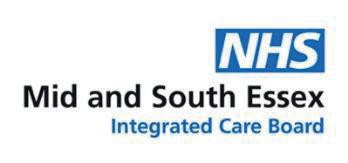
Mid and South Essex Integrated Care Board response to Provide CIC Quality Report 2024/25
As a commissioner of Provide services locally, Mid and South Essex Integrated Care Board (MSEICB) welcomes the opportunity to comment on this quality report
MSEICB is commenting on a draft version of this quality account, however, to the best of its knowledge, the information contained within this report is accurate and is representative of the quality of services delivered Any queries will have been fed back to Provide prior to publication for consideration of inclusion, along with any missing data in the final report
MSEICB is pleased to note the progress that Provide has made against the priorities for improvement that it set out last year MSEICB can see that steady progress is being made to achieve these priorities and measures are in place to continue to drive their achievement MSEICB notes that Provide has partaken in a number of audits, research and evaluation studies to ensure continuous quality improvement In addition, in 2024 Provide set up an Innovation Surgery that allows any member of the Provide team to take proposals for advance the way that services are delivered , and collectively work together to ensure improvements are continuous.
MSEICB would like to note the considerable work undertaken relating to the implementation and delivery of the NHS Patient Safety Incident Response Framework (PSIRF) They have established a culture of learning, transparency, and patient safety that demonstrates their commitment to high-quality safe care
MSEICB acknowledge the priorities that Provide have set for 2025/26 maintains focus on the sustained delivery of high-quality care that is safe, clinically effective and delivers a positive patient experience
Customer Engagement and Involvement
We will continue to develop our customer feedback processes to enable more people to give us feedback and to help us understand the lived experience of all people who use our services including people from hard-to-reach populations or who experience health inequalities
Deteriorating patients – community inpatient and virtual frailty wards
We will review our systems and processes to build our approaches to supporting people experiencing a deterioration in their condition to enhance safety
Category 4 pressure ulcers (inpatient and community)
We will continue to embed the PURPOSE T risk assessment process across the Organisation and evaluate the impact
Medication - Insulin Safety
We will review insulin incident themes and trends to identify opportunities to improve safety and quality
MSEICB considers the Provide CiC Quality Report for 2024/25 as providing an accurate and balanced picture of the reporting period MSE ICB will continue to seek assurance on performance and delivery of care by regular monitoring through agreed contract processes.
Finally, MSEICB would like the thank Provide, all their staff and volunteers for their continued hard work and dedication

Executive Chief Nursing Officer
Mid and South Essex Integrated Care Board
